ENA - ENA English
Headlines
Guterres Says Italy–Africa Summit Sends Strong Signal of Unity Amid Global Divides
Feb 13, 2026 380
ADDIS ABABA, February 13, 2026 (ENA) — António Guterres said the second Italy–Africa Summit taking place in Addis Ababa offers a powerful message of partnership at a time when the world faces mounting geopolitical and economic fragmentation. Addressing the high-level gathering, the United Nations Secretary General stressed that cooperation rooted in trust and mutual respect is vital to confront shared global challenges. He described the meeting as “a light in a world of growing divides,” urging that partnerships focus on advancing the 2030 Agenda for Sustainable Development and the African Union Agenda 2063. Referring to remarks by Giorgia Meloni, Guterres said Italy’s Mattei Plan demonstrates a renewed commitment to collaboration with Africa and could serve as a model for other partners. He outlined three urgent global priorities to maximize the impact of the initiative and address long standing structural imbalances while unlocking Africa’s potential. First, he pointed to the widening financing gap facing developing countries. According to Guterres, nations confront an annual 4 trillion US dollar shortfall in funding for the Sustainable Development Goals, while African countries pay up to eight times more to borrow than advanced economies. “The SDGs Stimulus sets out a roadmap to close the SDG gap, tackle debt distress and reshape a global financial architecture that reflects today’s realities, not yesterday’s power structures,” he stated. He called for stronger multilateral development banks, affordable long term financing and comprehensive debt solutions to reduce risk and borrowing costs. Such reforms, he noted, would also help tackle the root causes of irregular migration by creating employment opportunities and restoring hope. On climate change, Guterres warned that the world is on track to exceed the 1.5 degrees Celsius temperature limit. He emphasized Africa’s vast renewable energy resources and youthful population as key assets in driving a just energy transition. “With Africa’s renewable resources and young workforce, and partners bringing capital and technology, the clean energy transition can be a shared engine of growth. Yet Africa receives just 2 percent of global clean energy investment. This must change,” he emphasized. He urged scaled up investment in renewable energy, electricity grids and storage, alongside increased adaptation finance and early warning systems that protect lives. He also highlighted the need to mobilize 1.3 trillion US dollars annually for developing countries by 2035, as agreed during recent global climate discussions in Brazil, and called for fair value chains for critical minerals so that benefits reach African communities. Turning to digital transformation, Guterres underscored the importance of inclusion and equitable access. He revealed that he had submitted to the General Assembly a list of 40 experts to serve on an independent international scientific panel on artificial intelligence, whose first report will guide global dialogue on AI governance. “In July, we must ensure AI is safe, transparent and fair, with the benefits shared by all. That is why I am calling for a global fund on AI to build basic capacity in developing countries, skills, data and affordable computing power,” he underscored. Concluding his remarks, Guterres said Africa’s progress is central to global stability and prosperity. “Africa’s success is essential for a safer, more equal and more sustainable world. Let this summit help turn shared principles into shared progress and prosperity,” he stated.
AU Commission Ready to Make Italy–Africa Partnership Model of Balanced, Forward-Looking Cooperation
Feb 13, 2026 453
ADDIS ABABA, February 13, 2026 (ENA) — The African Union Commission has reaffirmed its readiness to work closely with the Government of Italy and other partners to ensure the Italy–Africa partnership becomes a model of balanced, forward-looking cooperation. Speaking at the Second Italy–Africa Summit in Addis Ababa, AU Commission Chairperson Mahmoud Ali Youssouf said the partnership must be anchored in Africa’s long-term development blueprint, Agenda 2063, and aligned with continental frameworks. “Anchored in Agenda 2063, aligned with continental frameworks and guided by transparency, predictability and mutual benefit, the African Union Commission stands ready to work closely with the Government of Italy and all partners to ensure that this partnership becomes a model of balance and forward-looking cooperation, advancing shared prosperity and stability across both continents,” he said. Youssouf noted that holding the summit in Addis Ababa on the margins of the AU Assembly underscores a shared commitment to structured and sustained engagement. “Africa’s partnerships must align with the continent’s priorities and Agenda 2063 and be grounded in mutual respect, shared responsibility and measurable impact,” he stressed. The Chairperson welcomed the growing momentum of the Italy–Africa partnership, highlighting Italy’s Mattei Plan as a signal of deeper cooperation in strategic sectors, including infrastructure, energy, agriculture, health, digital connectivity and water. He emphasized that infrastructure remains central to Africa’s transformation and must align with key continental initiatives such as the Programme for Infrastructure Development in Africa and the African Continental Free Trade Area. “Investments in transport corridors, energy interconnections and digital networks must strengthen intra-Africa trade, industrialization and competitiveness,” Youssouf said. Pointing to the Lobito Corridor as a positive example, he noted that Italy’s engagement could unlock trade opportunities and advance regional integration, while stressing the importance of close coordination with African institutions to ensure coherence and sustainability. The AU Commission Chairperson also underscored the need to move beyond raw material exports, calling for partnerships that support value addition, industrial capacity, technology transfer and skills development, particularly for Africa’s youth. “Such investments will generate decent jobs, foster innovation and address the structural drivers of poverty and instability,” he said. Referring to the AU’s theme of the year, Youssouf welcomed the focus on water and sanitation, describing them as foundational to public health, food security, education, gender equality and climate resilience. He concluded that the summit provides an opportunity to define “a practical and coherent roadmap for the next phase of Italy–Africa cooperation.”
Prime Minister Abiy Says Ethiopia Connecting Africa to the World, Italy Bridging Europe and Africa
Feb 13, 2026 555
Addis Ababa, February 13, 2026 (ENA)—Prime Minister Abiy Ahmed said Ethiopia is increasingly connecting Africa to the rest of the world, while commending Italy’s strategic vision to serve as a bridge between Europe and Africa, as the Second Italy–Africa Summit kicked off in Addis Ababa this evening. Addressing Heads of State and Government and distinguished guests at the opening session, the Prime Minister underscored Ethiopia’s growing continental and global role. “Ethiopia is increasingly connecting Africa to the world. At the continent's diplomatic capital, a growing hub for aviation and logistics and host of major global conferences, we are linking regions, markets and ideas, raising Africa's voice in global affairs,” he said. PM Abiy described the summit as a turning point in Africa–Europe relations. “This gathering marks a pivotal moment in Africa. Europe relations a moment to move from dialog to action and to turn ideas into clear outcomes for our people,” he stated. The Prime Minister noted that Ethiopia’s continued participation in the Italy–Africa partnership reflects determination to translate commitments into measurable development results. “Our participation in the first Italy Africa summit in 2024 and our continued engagement since reflects a shared commitment to move beyond words,” he said. Highlighting Africa’s demographic strength, PM Abiy stressed that the continent’s greatest asset is its people. “Excellencies, our greatest asset is our people. Africa is young, ambitious, ready to innovate and lead,” he said. He emphasized the central role of innovation and emerging technologies in shaping Africa’s future. “Technology, particularly artificial intelligence, is central to this future digital transformation and emerging technologies, modernize energy infrastructure, improve food systems, enhance health and enable trade while delivering people centered public services,” the Prime Minister stated. On the broader Africa–Europe partnership, PM Abiy said cooperation must remain balanced and forward-looking. “The Italy Africa partnerships, shows the cooperation can remain balanced and future focused. It shows that addressing migration, advancing climate action, unlocking Africa's potential and investing in use in technology must advance together,” he said. Reaffirming Ethiopia’s commitment to ensuring tangible outcomes, the Prime Minister concluded: “Ethiopia is fully committed to turning words into action, ensuring tangible benefits for our people.” The Second Italy–Africa Summit is being held for the first time on African soil and coincides with high-level engagements of the African Union in Addis Ababa.
AUC Urges Stronger Governance and Private Sector Role to Accelerate Africa’s Economic Transformation
Feb 13, 2026 412
Addis Ababa, February 13, 2026 (ENA)—The African Union Commission (AUC) has urged for stronger governance and enhanced role of private sector in a bid to accelerate continental economic transformation. Mahmoud Ali Youssouf, AUC Chairperson, made these remarks today at a high-level Africa Private Sector Forum held in Addis Ababa. He described stronger governance, deeper value-chain development, and greater private sector empowerment as key drivers of Africa’s economic transformation. Youssouf further stressed that sustainable economic governance relies on sound political leadership and institutional stability. “Economic governance flourishes when political governance is perfect and performant,” he said, noting the link between accountable governance, stability, and long-term prosperity. Using cocoa as an example, Youssouf noted that while several African countries rank among the world’s largest cacao producers, much of the chocolate manufacturing, and the higher-value profits, are captured abroad. “This dynamic leaves African economies exporting raw materials while importing finished goods at significantly higher prices, limiting industrial growth and wealth retention on the continent,” he added. He also addressed structural barriers affecting sectors such as pharmaceuticals and manufacturing, pointing to global trade tensions and lobbying pressures that can constrain market access and industrial expansion in Africa. “Trade war is a reality,” he remarked, underlining the urgency of building resilient and self-sustaining continental production capacities. Youssouf emphasized that strengthening regional value chains under the African Continental Free Trade Area (AfCFTA) is central to this strategy. Despite its potential, intra-African trade remains below 20 percent, hindered by infrastructure gaps, policy misalignment, and limited political coordination, he noted, adding that enhanced cooperation among African countries is essential to unlocking economies of scale and boosting competitiveness. The Chairperson also called for a shift in how governments engage the private sector. “Rather than treating businesses merely as service providers, policymakers should recognize them as strategic partners in shaping and implementing development strategies,” he said. “I believe in the development of the continent through the private sector”. Youssouf further affirmed that the African Union’s broader commitment to industrialization, regional integration, and economic sovereignty as pillars of Africa’s long-term development agenda. Francisca Tatchouop Belobe, Commissioner for Economic Development, Trade, Industry, and Mining at the African Union Commission, also urged investors to increase their investment in Africa, stressing: “Africa’s future growth is in your hands.” Amani Abou-Zeid, President of the Africa Business Council, highlighted ongoing challenges, including energy shortages and gaps in the supply of medicines and medical equipment. She underscored the private sector’s critical role in addressing these issues and called for increased investment to support solutions. “Trade war is a reality,” he remarked, underlining the urgency of building resilient and self-sustaining continental production capacities.Youssouf emphasized that strengthening regional value chains under the African Continental Free Trade Area (AfCFTA) is central to this strategy.
Italy–Africa Summit in Addis Aims to Refine, Strengthen Mattei Plan
Feb 13, 2026 354
ADDIS ABABA, February 13, 2026 (ENA) — The goal of the 2nd Italy–Africa Summit is not to celebrate past achievements but to collectively improve the effectiveness of the Mattei Plan, Italian Prime Minister Giorgia Meloni said today. The Mattei Plan, launched by the Italian Prime Minister Giorgia Meloni, aims to redefine Italy’s engagement with Africa through a strategic blend of political vision, development cooperation, and economic diplomacy. Framed as a non- predatory alternative to traditional models, the Plan seeks to position Italy as a credible and constructive partner by promoting co-creation with African stakeholders and delivering concrete, results-oriented projects. Speaking at the 2nd Italy–Africa Summit in Addis Ababa, the PM stressed that the goal of this summit is not to celebrate what is done so far, but to think together about what we can still do to make the party plan be even more efficient, more pragmatic and more consistent with the needs of the countries involved. According to her, the initiative’s success depends on continuous listening and adaptation. “Because if that's one thing that we've learned over the past few years is that the success of this initiative depends on our ability to keep listening, our ability to be ready, to fine tune our approach by learning from our mistakes drawing inspiration from African wisdom,” she noted. PM Meloni said no track can be drawn without meeting stones on our path. It is thanks to those stones and rocks that we can walk and move forward. The progress made so far should therefore be seen as a foundation for further cooperation, she added. “We want to continue in this direction, being aware that the results that we have achieved are not the end point, but are seeds that have been sown to have a richer and more thriving crop.” Highlighting Italy’s approach, the premier stated: “Our goal is not that of creating new dependencies, but to support the protagonism of the African peoples.” She also emphasized that Italy seeks partnership built on mutual respect. “We want to build things together. We want to find solutions together with humbleness and with respect,” the Prime Minister said. The Second Italy–Africa Summit is reviewing progress under the Mattei Plan and setting operational priorities for future cooperation in areas including energy, infrastructure, education, healthcare, and private sector development.
Politics
Guterres Says Italy–Africa Summit Sends Strong Signal of Unity Amid Global Divides
Feb 13, 2026 380
ADDIS ABABA, February 13, 2026 (ENA) — António Guterres said the second Italy–Africa Summit taking place in Addis Ababa offers a powerful message of partnership at a time when the world faces mounting geopolitical and economic fragmentation. Addressing the high-level gathering, the United Nations Secretary General stressed that cooperation rooted in trust and mutual respect is vital to confront shared global challenges. He described the meeting as “a light in a world of growing divides,” urging that partnerships focus on advancing the 2030 Agenda for Sustainable Development and the African Union Agenda 2063. Referring to remarks by Giorgia Meloni, Guterres said Italy’s Mattei Plan demonstrates a renewed commitment to collaboration with Africa and could serve as a model for other partners. He outlined three urgent global priorities to maximize the impact of the initiative and address long standing structural imbalances while unlocking Africa’s potential. First, he pointed to the widening financing gap facing developing countries. According to Guterres, nations confront an annual 4 trillion US dollar shortfall in funding for the Sustainable Development Goals, while African countries pay up to eight times more to borrow than advanced economies. “The SDGs Stimulus sets out a roadmap to close the SDG gap, tackle debt distress and reshape a global financial architecture that reflects today’s realities, not yesterday’s power structures,” he stated. He called for stronger multilateral development banks, affordable long term financing and comprehensive debt solutions to reduce risk and borrowing costs. Such reforms, he noted, would also help tackle the root causes of irregular migration by creating employment opportunities and restoring hope. On climate change, Guterres warned that the world is on track to exceed the 1.5 degrees Celsius temperature limit. He emphasized Africa’s vast renewable energy resources and youthful population as key assets in driving a just energy transition. “With Africa’s renewable resources and young workforce, and partners bringing capital and technology, the clean energy transition can be a shared engine of growth. Yet Africa receives just 2 percent of global clean energy investment. This must change,” he emphasized. He urged scaled up investment in renewable energy, electricity grids and storage, alongside increased adaptation finance and early warning systems that protect lives. He also highlighted the need to mobilize 1.3 trillion US dollars annually for developing countries by 2035, as agreed during recent global climate discussions in Brazil, and called for fair value chains for critical minerals so that benefits reach African communities. Turning to digital transformation, Guterres underscored the importance of inclusion and equitable access. He revealed that he had submitted to the General Assembly a list of 40 experts to serve on an independent international scientific panel on artificial intelligence, whose first report will guide global dialogue on AI governance. “In July, we must ensure AI is safe, transparent and fair, with the benefits shared by all. That is why I am calling for a global fund on AI to build basic capacity in developing countries, skills, data and affordable computing power,” he underscored. Concluding his remarks, Guterres said Africa’s progress is central to global stability and prosperity. “Africa’s success is essential for a safer, more equal and more sustainable world. Let this summit help turn shared principles into shared progress and prosperity,” he stated.
AU Commission Ready to Make Italy–Africa Partnership Model of Balanced, Forward-Looking Cooperation
Feb 13, 2026 453
ADDIS ABABA, February 13, 2026 (ENA) — The African Union Commission has reaffirmed its readiness to work closely with the Government of Italy and other partners to ensure the Italy–Africa partnership becomes a model of balanced, forward-looking cooperation. Speaking at the Second Italy–Africa Summit in Addis Ababa, AU Commission Chairperson Mahmoud Ali Youssouf said the partnership must be anchored in Africa’s long-term development blueprint, Agenda 2063, and aligned with continental frameworks. “Anchored in Agenda 2063, aligned with continental frameworks and guided by transparency, predictability and mutual benefit, the African Union Commission stands ready to work closely with the Government of Italy and all partners to ensure that this partnership becomes a model of balance and forward-looking cooperation, advancing shared prosperity and stability across both continents,” he said. Youssouf noted that holding the summit in Addis Ababa on the margins of the AU Assembly underscores a shared commitment to structured and sustained engagement. “Africa’s partnerships must align with the continent’s priorities and Agenda 2063 and be grounded in mutual respect, shared responsibility and measurable impact,” he stressed. The Chairperson welcomed the growing momentum of the Italy–Africa partnership, highlighting Italy’s Mattei Plan as a signal of deeper cooperation in strategic sectors, including infrastructure, energy, agriculture, health, digital connectivity and water. He emphasized that infrastructure remains central to Africa’s transformation and must align with key continental initiatives such as the Programme for Infrastructure Development in Africa and the African Continental Free Trade Area. “Investments in transport corridors, energy interconnections and digital networks must strengthen intra-Africa trade, industrialization and competitiveness,” Youssouf said. Pointing to the Lobito Corridor as a positive example, he noted that Italy’s engagement could unlock trade opportunities and advance regional integration, while stressing the importance of close coordination with African institutions to ensure coherence and sustainability. The AU Commission Chairperson also underscored the need to move beyond raw material exports, calling for partnerships that support value addition, industrial capacity, technology transfer and skills development, particularly for Africa’s youth. “Such investments will generate decent jobs, foster innovation and address the structural drivers of poverty and instability,” he said. Referring to the AU’s theme of the year, Youssouf welcomed the focus on water and sanitation, describing them as foundational to public health, food security, education, gender equality and climate resilience. He concluded that the summit provides an opportunity to define “a practical and coherent roadmap for the next phase of Italy–Africa cooperation.”
AUC Urges Stronger Governance and Private Sector Role to Accelerate Africa’s Economic Transformation
Feb 13, 2026 412
Addis Ababa, February 13, 2026 (ENA)—The African Union Commission (AUC) has urged for stronger governance and enhanced role of private sector in a bid to accelerate continental economic transformation. Mahmoud Ali Youssouf, AUC Chairperson, made these remarks today at a high-level Africa Private Sector Forum held in Addis Ababa. He described stronger governance, deeper value-chain development, and greater private sector empowerment as key drivers of Africa’s economic transformation. Youssouf further stressed that sustainable economic governance relies on sound political leadership and institutional stability. “Economic governance flourishes when political governance is perfect and performant,” he said, noting the link between accountable governance, stability, and long-term prosperity. Using cocoa as an example, Youssouf noted that while several African countries rank among the world’s largest cacao producers, much of the chocolate manufacturing, and the higher-value profits, are captured abroad. “This dynamic leaves African economies exporting raw materials while importing finished goods at significantly higher prices, limiting industrial growth and wealth retention on the continent,” he added. He also addressed structural barriers affecting sectors such as pharmaceuticals and manufacturing, pointing to global trade tensions and lobbying pressures that can constrain market access and industrial expansion in Africa. “Trade war is a reality,” he remarked, underlining the urgency of building resilient and self-sustaining continental production capacities. Youssouf emphasized that strengthening regional value chains under the African Continental Free Trade Area (AfCFTA) is central to this strategy. Despite its potential, intra-African trade remains below 20 percent, hindered by infrastructure gaps, policy misalignment, and limited political coordination, he noted, adding that enhanced cooperation among African countries is essential to unlocking economies of scale and boosting competitiveness. The Chairperson also called for a shift in how governments engage the private sector. “Rather than treating businesses merely as service providers, policymakers should recognize them as strategic partners in shaping and implementing development strategies,” he said. “I believe in the development of the continent through the private sector”. Youssouf further affirmed that the African Union’s broader commitment to industrialization, regional integration, and economic sovereignty as pillars of Africa’s long-term development agenda. Francisca Tatchouop Belobe, Commissioner for Economic Development, Trade, Industry, and Mining at the African Union Commission, also urged investors to increase their investment in Africa, stressing: “Africa’s future growth is in your hands.” Amani Abou-Zeid, President of the Africa Business Council, highlighted ongoing challenges, including energy shortages and gaps in the supply of medicines and medical equipment. She underscored the private sector’s critical role in addressing these issues and called for increased investment to support solutions. “Trade war is a reality,” he remarked, underlining the urgency of building resilient and self-sustaining continental production capacities.Youssouf emphasized that strengthening regional value chains under the African Continental Free Trade Area (AfCFTA) is central to this strategy.
PM Abiy Calls for Bold Africa–Europe Partnership at Second Italy–Africa Summit
Feb 13, 2026 710
Addis Ababa, February 13, 2026 (ENA)—Prime Minister Abiy Ahmed has called for a transformative Africa–Europe partnership anchored in shared prosperity, dignity, and mutual benefit, as he officially opened the Second Italy–Africa Summit in Addis Ababa. Addressing the opening session co-hosted by Ethiopia and Italy, the Prime Minister said Africa’s youthful dynamism combined with Europe’s experience, technology, and capital can unlock unprecedented growth and opportunity. “By combining Africa’s energetic and creative population with Europe’s experience, technology and capital, we can build solutions that deliver prosperity to our continents and beyond,” he said. Describing the summit as a pivotal moment in Africa–Europe relations, Premier Abiy emphasized the need to move beyond dialogue toward concrete outcomes. “This gathering marks a defining moment, a moment to move from dialogue to action and turn ideas into clear results for our people.” The Prime Minister welcomed Italy’s forward-looking Mattei Plan, noting that it aligns closely with Ethiopia’s national development priorities and reform agenda. “The Mattei Plan complements our homegrown economic reforms across renewable energy, climate resilience, smart agriculture, infrastructure, digital transformation, and human capital development,” he noted. Highlighting Ethiopia’s rapid transformation, Prime Minister Abiy pointed to major hydropower projects, expanding regional energy interconnections, railway and aviation infrastructure, and the establishment of innovation hubs as pillars of sustainable development. “Ethiopia is laying the foundation for sustainable growth and shared progress across Africa.” He underscored Addis Ababa’s role as Africa’s diplomatic capital and a growing hub for aviation, logistics, and global conferences, positioning Ethiopia as a bridge connecting Africa to global markets and ideas. Stressing Africa’s demographic strength, the Prime Minister described the continent’s young population as its greatest asset. “Africa is young, ambitious, ready to innovate and lead. By investing in youth and skills, we can create jobs, unlock talent, and prepare for tomorrow’s opportunities.” He highlighted the transformative role of digital innovation and artificial intelligence in modernizing energy systems, food production, healthcare, trade, and public services. PM Abiy also framed the Italy–Africa partnership as a model for balanced and forward-looking cooperation — addressing migration, climate action, economic growth, and technological advancement in an integrated manner. In a strong closing message, he called for a redefined Africa–Europe relationship: “Together, we can shape a new Africa–Europe partnership — not based on dependency but dignity, not on extraction but shared prosperity, not on the past but on a future we build together.” The Prime Minister reaffirmed Ethiopia’s commitment to deepening strategic cooperation with Italy and across Africa, urging leaders to move forward with determination. The Second Italy–Africa Summit is being held for the first time on African soil and coincides with high-level meetings of the African Union in Addis Ababa.
Second Italy–Africa Summit Highlights Expanded Cooperation in Addis Ababa
Feb 13, 2026 601
Addis Ababa, February 13, 2026 (ENA)—The Second Italy–Africa Summit convened today in Addis Ababa, underscoring a renewed commitment to deepening political and economic cooperation between Italy and African nations across key strategic sectors. The high-level forum, being held on African soil for the first time, brings together Heads of State and Government to advance partnerships under Italy’s Mattei Plan for Africa — a framework launched in 2024 to promote structured, long-term collaboration. Ethiopia is co-hosting the summit in partnership with the Government of the Italian Republic, reflecting the strengthening ties between the two sides. In a statement, the Office of the Prime Minister of Ethiopia said: “Guided by the spirit of Medemer, Ethiopia bridges Italy and Africa as it co-hosts the Second Italy–Africa Summit in Addis Ababa. As the Land of Origins, we gather to advance shared progress — strengthening political and economic ties while fostering trade, innovation, and investment across Africa.” Abiy Ahmed and Giorgia Meloni are attending the summit, which coincides with the 39th Ordinary Session of the Assembly of the Heads of State and Government of the African Union. The summit is expected to further consolidate collaborative efforts and foster stronger economic and strategic relations between Italy and African countries, with discussions focusing on trade, investment, energy, infrastructure, agriculture, and innovation. Hosting the gathering in Addis Ababa — widely regarded as the diplomatic capital of Africa and seat of the African Union — underscores Ethiopia’s growing role as a platform for high-level multilateral engagement and its commitment to strengthening Africa’s partnerships with global actors. The Second Italy–Africa Summit is distinct from the “Invest in Ethiopia 2026” High-Level Business Forum scheduled for March 26–27, 2026.
Prime Minister Abiy Welcomes Italian Counterpart Giorgia Meloni for Italy–Africa Summit
Feb 13, 2026 439
Addis Ababa, February 13, 2026 (ENA)—Prime Minister Abiy Ahmed has welcomed Giorgia Meloni to Ethiopia as the two leaders co-host the Second Italy–Africa Summit, marking a significant moment in strengthening ties between African nations and Italy. In a message shared on social media, Prime Minister Abiy described it as a “great honour and pleasure” to receive Prime Minister Meloni, highlighting the importance of the occasion beyond formal diplomacy. He noted that the summit represents more than a high-level gathering, characterizing it as a symbol of the deepening partnership between Italy and Africa — one rooted in mutual respect, shared responsibility, and a common vision for sustainable growth. Prime Minister Meloni’s visit underscores a shared commitment to expanding cooperation across key sectors, including trade, investment, energy, infrastructure, agriculture, and innovation. The Second Italy–Africa Summit is expected to further consolidate collaborative efforts and foster stronger economic and strategic relations between Italy and African countries.
Rwandan, Moroccan Prime Ministers Arrive in Addis Ababa for 39th AU Summit
Feb 13, 2026 387
Addis Ababa, February 13, 2026 (ENA)—The Prime Minister of Rwanda, Justin Nsengiyumva, and the Prime Minister of the Kingdom of Morocco, Aziz Akhannouch, have arrived in Addis Ababa to take part in the 39th Ordinary Session of the Assembly of Heads of State and Government of the African Union. The two leaders were received at Bole International Airport by Ethiopia’s Minister of Peace, Mohamed Edris, and State Minister for Foreign Affairs, Berhanu Tsegaye. The 39th AU Summit convenes under the theme “Assuring Sustainable Water Availability and Safe Sanitation Systems to Achieve the Goals of Agenda 2063,” providing a platform for leaders to deliberate on continental peace and security, the African Continental Free Trade Area, and climate resilience initiatives.
Libyan President Arrives in Addis Ababa for 39th AU Summit
Feb 13, 2026 361
Addis Ababa, February 13, 2026 (ENA)—President Mohamed Younis Menfi of Libya arrived in Addis Ababa this afternoon to participate in the 39th Ordinary Session of the Assembly of Heads of State and Government of the African Union. Upon arrival at Addis Ababa Bole International Airport, President Menfi was received by Minister of Peace Mohamed Edris and State Minister for Foreign Affairs Ambassador Berhanu Tsegaye. Heads of state and government from across the continent are gathering in the Ethiopian capital for the high-level summit, which will deliberate on key political and development priorities for Africa.
Politics
Guterres Says Italy–Africa Summit Sends Strong Signal of Unity Amid Global Divides
Feb 13, 2026 380
ADDIS ABABA, February 13, 2026 (ENA) — António Guterres said the second Italy–Africa Summit taking place in Addis Ababa offers a powerful message of partnership at a time when the world faces mounting geopolitical and economic fragmentation. Addressing the high-level gathering, the United Nations Secretary General stressed that cooperation rooted in trust and mutual respect is vital to confront shared global challenges. He described the meeting as “a light in a world of growing divides,” urging that partnerships focus on advancing the 2030 Agenda for Sustainable Development and the African Union Agenda 2063. Referring to remarks by Giorgia Meloni, Guterres said Italy’s Mattei Plan demonstrates a renewed commitment to collaboration with Africa and could serve as a model for other partners. He outlined three urgent global priorities to maximize the impact of the initiative and address long standing structural imbalances while unlocking Africa’s potential. First, he pointed to the widening financing gap facing developing countries. According to Guterres, nations confront an annual 4 trillion US dollar shortfall in funding for the Sustainable Development Goals, while African countries pay up to eight times more to borrow than advanced economies. “The SDGs Stimulus sets out a roadmap to close the SDG gap, tackle debt distress and reshape a global financial architecture that reflects today’s realities, not yesterday’s power structures,” he stated. He called for stronger multilateral development banks, affordable long term financing and comprehensive debt solutions to reduce risk and borrowing costs. Such reforms, he noted, would also help tackle the root causes of irregular migration by creating employment opportunities and restoring hope. On climate change, Guterres warned that the world is on track to exceed the 1.5 degrees Celsius temperature limit. He emphasized Africa’s vast renewable energy resources and youthful population as key assets in driving a just energy transition. “With Africa’s renewable resources and young workforce, and partners bringing capital and technology, the clean energy transition can be a shared engine of growth. Yet Africa receives just 2 percent of global clean energy investment. This must change,” he emphasized. He urged scaled up investment in renewable energy, electricity grids and storage, alongside increased adaptation finance and early warning systems that protect lives. He also highlighted the need to mobilize 1.3 trillion US dollars annually for developing countries by 2035, as agreed during recent global climate discussions in Brazil, and called for fair value chains for critical minerals so that benefits reach African communities. Turning to digital transformation, Guterres underscored the importance of inclusion and equitable access. He revealed that he had submitted to the General Assembly a list of 40 experts to serve on an independent international scientific panel on artificial intelligence, whose first report will guide global dialogue on AI governance. “In July, we must ensure AI is safe, transparent and fair, with the benefits shared by all. That is why I am calling for a global fund on AI to build basic capacity in developing countries, skills, data and affordable computing power,” he underscored. Concluding his remarks, Guterres said Africa’s progress is central to global stability and prosperity. “Africa’s success is essential for a safer, more equal and more sustainable world. Let this summit help turn shared principles into shared progress and prosperity,” he stated.
AU Commission Ready to Make Italy–Africa Partnership Model of Balanced, Forward-Looking Cooperation
Feb 13, 2026 453
ADDIS ABABA, February 13, 2026 (ENA) — The African Union Commission has reaffirmed its readiness to work closely with the Government of Italy and other partners to ensure the Italy–Africa partnership becomes a model of balanced, forward-looking cooperation. Speaking at the Second Italy–Africa Summit in Addis Ababa, AU Commission Chairperson Mahmoud Ali Youssouf said the partnership must be anchored in Africa’s long-term development blueprint, Agenda 2063, and aligned with continental frameworks. “Anchored in Agenda 2063, aligned with continental frameworks and guided by transparency, predictability and mutual benefit, the African Union Commission stands ready to work closely with the Government of Italy and all partners to ensure that this partnership becomes a model of balance and forward-looking cooperation, advancing shared prosperity and stability across both continents,” he said. Youssouf noted that holding the summit in Addis Ababa on the margins of the AU Assembly underscores a shared commitment to structured and sustained engagement. “Africa’s partnerships must align with the continent’s priorities and Agenda 2063 and be grounded in mutual respect, shared responsibility and measurable impact,” he stressed. The Chairperson welcomed the growing momentum of the Italy–Africa partnership, highlighting Italy’s Mattei Plan as a signal of deeper cooperation in strategic sectors, including infrastructure, energy, agriculture, health, digital connectivity and water. He emphasized that infrastructure remains central to Africa’s transformation and must align with key continental initiatives such as the Programme for Infrastructure Development in Africa and the African Continental Free Trade Area. “Investments in transport corridors, energy interconnections and digital networks must strengthen intra-Africa trade, industrialization and competitiveness,” Youssouf said. Pointing to the Lobito Corridor as a positive example, he noted that Italy’s engagement could unlock trade opportunities and advance regional integration, while stressing the importance of close coordination with African institutions to ensure coherence and sustainability. The AU Commission Chairperson also underscored the need to move beyond raw material exports, calling for partnerships that support value addition, industrial capacity, technology transfer and skills development, particularly for Africa’s youth. “Such investments will generate decent jobs, foster innovation and address the structural drivers of poverty and instability,” he said. Referring to the AU’s theme of the year, Youssouf welcomed the focus on water and sanitation, describing them as foundational to public health, food security, education, gender equality and climate resilience. He concluded that the summit provides an opportunity to define “a practical and coherent roadmap for the next phase of Italy–Africa cooperation.”
AUC Urges Stronger Governance and Private Sector Role to Accelerate Africa’s Economic Transformation
Feb 13, 2026 412
Addis Ababa, February 13, 2026 (ENA)—The African Union Commission (AUC) has urged for stronger governance and enhanced role of private sector in a bid to accelerate continental economic transformation. Mahmoud Ali Youssouf, AUC Chairperson, made these remarks today at a high-level Africa Private Sector Forum held in Addis Ababa. He described stronger governance, deeper value-chain development, and greater private sector empowerment as key drivers of Africa’s economic transformation. Youssouf further stressed that sustainable economic governance relies on sound political leadership and institutional stability. “Economic governance flourishes when political governance is perfect and performant,” he said, noting the link between accountable governance, stability, and long-term prosperity. Using cocoa as an example, Youssouf noted that while several African countries rank among the world’s largest cacao producers, much of the chocolate manufacturing, and the higher-value profits, are captured abroad. “This dynamic leaves African economies exporting raw materials while importing finished goods at significantly higher prices, limiting industrial growth and wealth retention on the continent,” he added. He also addressed structural barriers affecting sectors such as pharmaceuticals and manufacturing, pointing to global trade tensions and lobbying pressures that can constrain market access and industrial expansion in Africa. “Trade war is a reality,” he remarked, underlining the urgency of building resilient and self-sustaining continental production capacities. Youssouf emphasized that strengthening regional value chains under the African Continental Free Trade Area (AfCFTA) is central to this strategy. Despite its potential, intra-African trade remains below 20 percent, hindered by infrastructure gaps, policy misalignment, and limited political coordination, he noted, adding that enhanced cooperation among African countries is essential to unlocking economies of scale and boosting competitiveness. The Chairperson also called for a shift in how governments engage the private sector. “Rather than treating businesses merely as service providers, policymakers should recognize them as strategic partners in shaping and implementing development strategies,” he said. “I believe in the development of the continent through the private sector”. Youssouf further affirmed that the African Union’s broader commitment to industrialization, regional integration, and economic sovereignty as pillars of Africa’s long-term development agenda. Francisca Tatchouop Belobe, Commissioner for Economic Development, Trade, Industry, and Mining at the African Union Commission, also urged investors to increase their investment in Africa, stressing: “Africa’s future growth is in your hands.” Amani Abou-Zeid, President of the Africa Business Council, highlighted ongoing challenges, including energy shortages and gaps in the supply of medicines and medical equipment. She underscored the private sector’s critical role in addressing these issues and called for increased investment to support solutions. “Trade war is a reality,” he remarked, underlining the urgency of building resilient and self-sustaining continental production capacities.Youssouf emphasized that strengthening regional value chains under the African Continental Free Trade Area (AfCFTA) is central to this strategy.
PM Abiy Calls for Bold Africa–Europe Partnership at Second Italy–Africa Summit
Feb 13, 2026 710
Addis Ababa, February 13, 2026 (ENA)—Prime Minister Abiy Ahmed has called for a transformative Africa–Europe partnership anchored in shared prosperity, dignity, and mutual benefit, as he officially opened the Second Italy–Africa Summit in Addis Ababa. Addressing the opening session co-hosted by Ethiopia and Italy, the Prime Minister said Africa’s youthful dynamism combined with Europe’s experience, technology, and capital can unlock unprecedented growth and opportunity. “By combining Africa’s energetic and creative population with Europe’s experience, technology and capital, we can build solutions that deliver prosperity to our continents and beyond,” he said. Describing the summit as a pivotal moment in Africa–Europe relations, Premier Abiy emphasized the need to move beyond dialogue toward concrete outcomes. “This gathering marks a defining moment, a moment to move from dialogue to action and turn ideas into clear results for our people.” The Prime Minister welcomed Italy’s forward-looking Mattei Plan, noting that it aligns closely with Ethiopia’s national development priorities and reform agenda. “The Mattei Plan complements our homegrown economic reforms across renewable energy, climate resilience, smart agriculture, infrastructure, digital transformation, and human capital development,” he noted. Highlighting Ethiopia’s rapid transformation, Prime Minister Abiy pointed to major hydropower projects, expanding regional energy interconnections, railway and aviation infrastructure, and the establishment of innovation hubs as pillars of sustainable development. “Ethiopia is laying the foundation for sustainable growth and shared progress across Africa.” He underscored Addis Ababa’s role as Africa’s diplomatic capital and a growing hub for aviation, logistics, and global conferences, positioning Ethiopia as a bridge connecting Africa to global markets and ideas. Stressing Africa’s demographic strength, the Prime Minister described the continent’s young population as its greatest asset. “Africa is young, ambitious, ready to innovate and lead. By investing in youth and skills, we can create jobs, unlock talent, and prepare for tomorrow’s opportunities.” He highlighted the transformative role of digital innovation and artificial intelligence in modernizing energy systems, food production, healthcare, trade, and public services. PM Abiy also framed the Italy–Africa partnership as a model for balanced and forward-looking cooperation — addressing migration, climate action, economic growth, and technological advancement in an integrated manner. In a strong closing message, he called for a redefined Africa–Europe relationship: “Together, we can shape a new Africa–Europe partnership — not based on dependency but dignity, not on extraction but shared prosperity, not on the past but on a future we build together.” The Prime Minister reaffirmed Ethiopia’s commitment to deepening strategic cooperation with Italy and across Africa, urging leaders to move forward with determination. The Second Italy–Africa Summit is being held for the first time on African soil and coincides with high-level meetings of the African Union in Addis Ababa.
Second Italy–Africa Summit Highlights Expanded Cooperation in Addis Ababa
Feb 13, 2026 601
Addis Ababa, February 13, 2026 (ENA)—The Second Italy–Africa Summit convened today in Addis Ababa, underscoring a renewed commitment to deepening political and economic cooperation between Italy and African nations across key strategic sectors. The high-level forum, being held on African soil for the first time, brings together Heads of State and Government to advance partnerships under Italy’s Mattei Plan for Africa — a framework launched in 2024 to promote structured, long-term collaboration. Ethiopia is co-hosting the summit in partnership with the Government of the Italian Republic, reflecting the strengthening ties between the two sides. In a statement, the Office of the Prime Minister of Ethiopia said: “Guided by the spirit of Medemer, Ethiopia bridges Italy and Africa as it co-hosts the Second Italy–Africa Summit in Addis Ababa. As the Land of Origins, we gather to advance shared progress — strengthening political and economic ties while fostering trade, innovation, and investment across Africa.” Abiy Ahmed and Giorgia Meloni are attending the summit, which coincides with the 39th Ordinary Session of the Assembly of the Heads of State and Government of the African Union. The summit is expected to further consolidate collaborative efforts and foster stronger economic and strategic relations between Italy and African countries, with discussions focusing on trade, investment, energy, infrastructure, agriculture, and innovation. Hosting the gathering in Addis Ababa — widely regarded as the diplomatic capital of Africa and seat of the African Union — underscores Ethiopia’s growing role as a platform for high-level multilateral engagement and its commitment to strengthening Africa’s partnerships with global actors. The Second Italy–Africa Summit is distinct from the “Invest in Ethiopia 2026” High-Level Business Forum scheduled for March 26–27, 2026.
Prime Minister Abiy Welcomes Italian Counterpart Giorgia Meloni for Italy–Africa Summit
Feb 13, 2026 439
Addis Ababa, February 13, 2026 (ENA)—Prime Minister Abiy Ahmed has welcomed Giorgia Meloni to Ethiopia as the two leaders co-host the Second Italy–Africa Summit, marking a significant moment in strengthening ties between African nations and Italy. In a message shared on social media, Prime Minister Abiy described it as a “great honour and pleasure” to receive Prime Minister Meloni, highlighting the importance of the occasion beyond formal diplomacy. He noted that the summit represents more than a high-level gathering, characterizing it as a symbol of the deepening partnership between Italy and Africa — one rooted in mutual respect, shared responsibility, and a common vision for sustainable growth. Prime Minister Meloni’s visit underscores a shared commitment to expanding cooperation across key sectors, including trade, investment, energy, infrastructure, agriculture, and innovation. The Second Italy–Africa Summit is expected to further consolidate collaborative efforts and foster stronger economic and strategic relations between Italy and African countries.
Rwandan, Moroccan Prime Ministers Arrive in Addis Ababa for 39th AU Summit
Feb 13, 2026 387
Addis Ababa, February 13, 2026 (ENA)—The Prime Minister of Rwanda, Justin Nsengiyumva, and the Prime Minister of the Kingdom of Morocco, Aziz Akhannouch, have arrived in Addis Ababa to take part in the 39th Ordinary Session of the Assembly of Heads of State and Government of the African Union. The two leaders were received at Bole International Airport by Ethiopia’s Minister of Peace, Mohamed Edris, and State Minister for Foreign Affairs, Berhanu Tsegaye. The 39th AU Summit convenes under the theme “Assuring Sustainable Water Availability and Safe Sanitation Systems to Achieve the Goals of Agenda 2063,” providing a platform for leaders to deliberate on continental peace and security, the African Continental Free Trade Area, and climate resilience initiatives.
Libyan President Arrives in Addis Ababa for 39th AU Summit
Feb 13, 2026 361
Addis Ababa, February 13, 2026 (ENA)—President Mohamed Younis Menfi of Libya arrived in Addis Ababa this afternoon to participate in the 39th Ordinary Session of the Assembly of Heads of State and Government of the African Union. Upon arrival at Addis Ababa Bole International Airport, President Menfi was received by Minister of Peace Mohamed Edris and State Minister for Foreign Affairs Ambassador Berhanu Tsegaye. Heads of state and government from across the continent are gathering in the Ethiopian capital for the high-level summit, which will deliberate on key political and development priorities for Africa.
Social
African Ministers Call for Health Financing Sovereignty to Build Resilient Systems
Feb 13, 2026 561
Addis Ababa, February 13, 2026 (ENA)—African Ministers and health officials have called for urgent action to secure financial health sovereignty as a foundation for building resilient health systems across the continent. The call was made during a High-Level Event on Advancing Africa’s Health Security Sovereignty, which focused on strengthening collaboration between finance and health leadership. The event was co-hosted by the Africa Centre for Disease Control and Prevention, the African Development Bank Group and the African Union Development Agency. Ministers of Health and Finance from across Africa attended the meeting to explore ways of enhancing domestic health financing and reducing dependency on external support. Speaking at the event, Ethiopia’s Minister of Health and Deputy Chair of the Africa CDC Board, Dr. Mekdes Daba, said the continent is operating in a rapidly shifting global landscape marked by recurrent outbreaks, evolving geopolitical realities and declining external assistance. She noted that these changes have exposed the risks of over reliance on external systems. Building consolidated continental capacity, she said, is not merely an institutional ambition but a strategic necessity. “Strengthened regional collaboration, sustained country level investment, technical capacity, strong governance and greater self-reliance are the aspirations we must collectively pursue,” she said. Director General of Africa CDC, Dr. Jean Kaseya, stressed that Africa must take ownership of its health agenda. “Africa must define its own health priorities, lead its own solutions and finance its own resilience from within,” he said. According to him, Africa Health Security and Sovereignty represent a unifying vision that reframes health not as a social sector expense but as a pillar of continental sovereignty, economic resilience and geopolitical credibility. “Africa's health security is inseparable from its economic future and global standing,” he underscored. Dr. Kaseya further emphasized the need to address inefficiencies in existing spending. “Africa's path out of aid dependency will not be found by chasing more money, but by stopping the massive inefficiencies and waste in the money it already has,” he stressed. Chief Executive Officer of AUDA NEPAD, Nardos Bekele, said sustainable health financing requires structural reform and deliberate mobilization of blended investments to complement diverse domestic resources while reducing reliance on external funding. “Health sovereignty can no longer be a slogan. It must become our financing strategy,” she affirmed, noting that investments in health should be viewed as core economic strategy rather than consumptive expenditure. President of the African Development Bank Group, Sidi Ould Tah, said the Bank is advancing a new African financial architecture that moves beyond traditional debt limitations. He highlighted the deployment of innovative financial instruments and risk mitigation mechanisms to attract private sector investment and treat health as a productive social investment. “We need to mobilize the resources required to close our funding gap and reduce out of pocket expenditure for our citizens,” he underlined. Participants agreed that strengthening domestic health financing is central to securing Africa’s long term economic stability and resilience.
Ethiopia's Experience Shows Countries Can Make Progress in Child Survival, Nutrition Outcomes, Says AU Nutrition Champion
Feb 12, 2026 3514
Addis Ababa, February 12, 2026 (ENA)--Ethiopia's experience shows that with strong political will, sustained investment, community engagement and strategic partnerships, countries can make measurable progress in child survival, anemia reduction and overall nutrition outcomes, even in resource constrained settings, King Letsie III of Lesotho and African Union Nutrition Champion said today. He made the remark, following a visit to Zewditu Memorial Hospital in Addis Ababa, where the King observed Ethiopia’s integrated approach to maternal and child health. These are deliberate national efforts to break the intergenerational cycle of malnutrition, he stated, adding that "as the African Union champion for nutrition, I am convinced that what I have seen here today is a model worthy of emulation across the length and breadth of our continent." The King emphasized that Ethiopia’s progress — achieved through community-based health insurance and technology-backed systems, demonstrates that measurable gains in child survival and anemia reduction are possible even in resource-constrained settings when backed by strong political will. For her part, Ethiopia's Health Minister Mekdes Daba highlighted that the government’s dedication has led to a significant decline in maternal and infant mortality. She attributed the success to a robust network of over 40,000 health extension workers who ensure quality service delivery in both urban and rural communities. "This visit is about showing a commitment at the government level," Mekdes stated. "The determination is only deliberate when we have professionals on the ground... we have exemplary works in our hospitals and across every region of our country." Joel Spicer, President and CEO of Nutrition International, underscored the urgency of Ethiopia’s mission, noting that of the 30 million children projected to die from preventable causes globally in the next five years, 18 million are in Africa. He commended Ethiopia’s comprehensive strategy, which spans from schools to maternal care. "Ethiopia has the courage and the vision and the leadership, and those are three very important Ingredients if we are going to save children from dying, they are integrating new interventions." The nation is integrating new interventions, such as double-fortified salt and taking more agency on Vitamin A. That’s wonderful, he added. The visit coincides with the 48th Ordinary Session of the AU Executive Council, held under the theme of ensuring sustainable water and sanitation to achieve Agenda 2063 goals.
Civil Society Council Vows Expanded Engagement as National Dialogue Reaches Pivotal Stage
Feb 9, 2026 978
Addis Ababa, February 9, 2026 (ENA)— The Ethiopian Civil Society Organizations Council has pledged to step up its engagement to help ensure the success of Ethiopia’s National Dialogue, saying the consultation process has entered a critical and decisive phase. The Council said it is working closely with the Ethiopian National Dialogue Commission to support consultations aimed at building national consensus by narrowing differences on key political and social issues. The Ethiopian National Dialogue Commission was established by the House of People’s Representatives under Proclamation No. 1265/2022 as an independent body mandated to facilitate an inclusive, nationwide dialogue. The Commission has so far conducted agenda gathering and participant identification in eleven regions and two city administrations. Speaking to the Ethiopian News Agency, President of the Civil Society Organizations Council, Ahmed Hussein, said the Council has been mobilizing civil society organizations to play a meaningful and structured role in the process. “We have been working to ensure that civil society organizations contribute significantly to the national consultation,” Ahmed said. He explained that civil society groups are actively engaged in public awareness creation, agenda setting and the recruitment of participants in coordination with the National Dialogue Commission. Ahmed noted that cooperation between the two institutions has been formalized through a memorandum of understanding, which has enabled joint activities to be implemented. “Based on the agreement, many joint activities are being implemented,” he said. According to Ahmed, the inclusiveness of the consultation is being demonstrated in practice. He said women, youth, persons with disabilities, elders and scholars are participating alongside broader public involvement across regions. He added that as the consultation moves into a more sensitive phase, the Council plans to further strengthen its contribution to help guarantee a successful outcome. “The national consultation is a major opportunity to move away from resolving differences through force and towards a political culture guided by dialogue and the power of ideas,” Ahmed said. He also underscored the wider importance of the process, noting that the consultation lays a foundation for state building by enabling citizens to freely deliberate on national issues. Ethiopia’s National Dialogue is part of a broader effort to address long standing political and social divisions through inclusive discussion rather than confrontation. Launched amid ongoing reforms and post conflict recovery efforts, the process seeks to build a shared national understanding on core political, social and governance questions by engaging citizens across regions and social groups. Civil society organizations have been identified as key actors in this effort due to their grassroots presence and experience in community mobilization. The renewed commitment by the Civil Society Organizations Council comes as agenda consolidation and participant engagement advance toward substantive deliberations, making coordination, inclusiveness and public trust central to the credibility and eventual outcomes of the national consultation.
Ethiopia Acts on Water Sustainability Commitments: Minister Habtamu Itefa
Feb 9, 2026 1857
Addis Ababa, February 9, 2026 (ENA)—Ethiopia is backing continental water sustainability efforts with concrete action rather than rhetoric in line with Africa’s long term development goals, Minister of Water and Energy Habtamu Itefa said. The African Union Economic, Social and Cultural Council Civil Society Pre Summit on the 2026 African Union Theme of the Year, “Assuring Sustainable Water Availability and Safe Sanitation Systems to Achieve the Goals of Agenda 2063,” held today in Addis Ababa. Opening the pre-summit, the minister said Ethiopia is honored to host the gathering, describing it as a reflection of the country’s sustained engagement in continental initiatives. “Ethiopia is walking the talk in supporting water sustainability across Africa,” the minister said, adding that the country’s actions demonstrate its responsibility to shared regional priorities. He noted that hosting the pre-summit aligns with Ethiopia’s continued commitment to advancing African Union agendas, particularly those focused on water security and safe sanitation. “As the host of the African Union headquarters, we understand our responsibility to support continental initiatives with action not just with words,” he added. Stating major commitments and notable achievements of the country so far, he said “we have been walking the talk in terms of sustaining our water resources.” During the last seven years, Ethiopia has initiated the green legacy program and planted more than 48 billion tree seedlings across the nation, which is crucial for water management and protecting soil erosion, among others. The minister also stated the significant role of the country’s policy to protect water from pollution and the riverside program especially being carried out in Addis Ababa. “If we join hands especially as Africans, for sure the rivers we have are blessings for everyone.” Stating the significant role of civil societies in which they can support all essential initiatives, he said “AU 2026 theme is our collective promise to African children.” The minister also emphasized that it is time for everyone to build the future, to build for the next generation, affirming that Ethiopia remains committed to join its hand with all partners who really wish to achieve the continent’s goal. African Union Commissioner for Agriculture, Rural Development, Blue Economy, and Sustainable Environment (ARBE), Moses Vilakati said water and sanitation are central to Africa’s transformation. According to the commissioner, without water security and safe sanitation, there can be no food security, no rural transformation, no sustainable cities, no viable economy and no climate resilience. The commissioner further elaborated that 400 million people still do not have access to clean drinking water, and over 700 million people still do not have good sanitation facilities in Africa. Today, Africa stands at a critical crossroads, he said adding climate change, environmental degradation, rapid urbanization and competing demands on shared water resources are intensifying pressures across the continent. Addressing water and sanitation is a matter of equity, a matter of justice, a matter of human dignity and basic needs, he underscored. The African Union Commission is fully committed to providing political leadership and strategic coordination for the implementation of the 2026 AU theme of the year, working with member states, regional economic communities, among others. The pre-summit must send a clear message that Africa will take ownership of its water and sanitation agenda, he asserted. “We must strengthen transboundary water cooperation, prioritize climate resilient infrastructure, promote inclusive sanitation systems and allow partnerships that deliver impact where it matters the most, particularly at community level.” Addressing Africa's water and sanitation challenges demands the comprehensive, integrated, and people-centered approach that defines Agenda 2063's philosophy of African ownership and African solutions, it was learned.
Economy
AU Commission Ready to Make Italy–Africa Partnership Model of Balanced, Forward-Looking Cooperation
Feb 13, 2026 453
ADDIS ABABA, February 13, 2026 (ENA) — The African Union Commission has reaffirmed its readiness to work closely with the Government of Italy and other partners to ensure the Italy–Africa partnership becomes a model of balanced, forward-looking cooperation. Speaking at the Second Italy–Africa Summit in Addis Ababa, AU Commission Chairperson Mahmoud Ali Youssouf said the partnership must be anchored in Africa’s long-term development blueprint, Agenda 2063, and aligned with continental frameworks. “Anchored in Agenda 2063, aligned with continental frameworks and guided by transparency, predictability and mutual benefit, the African Union Commission stands ready to work closely with the Government of Italy and all partners to ensure that this partnership becomes a model of balance and forward-looking cooperation, advancing shared prosperity and stability across both continents,” he said. Youssouf noted that holding the summit in Addis Ababa on the margins of the AU Assembly underscores a shared commitment to structured and sustained engagement. “Africa’s partnerships must align with the continent’s priorities and Agenda 2063 and be grounded in mutual respect, shared responsibility and measurable impact,” he stressed. The Chairperson welcomed the growing momentum of the Italy–Africa partnership, highlighting Italy’s Mattei Plan as a signal of deeper cooperation in strategic sectors, including infrastructure, energy, agriculture, health, digital connectivity and water. He emphasized that infrastructure remains central to Africa’s transformation and must align with key continental initiatives such as the Programme for Infrastructure Development in Africa and the African Continental Free Trade Area. “Investments in transport corridors, energy interconnections and digital networks must strengthen intra-Africa trade, industrialization and competitiveness,” Youssouf said. Pointing to the Lobito Corridor as a positive example, he noted that Italy’s engagement could unlock trade opportunities and advance regional integration, while stressing the importance of close coordination with African institutions to ensure coherence and sustainability. The AU Commission Chairperson also underscored the need to move beyond raw material exports, calling for partnerships that support value addition, industrial capacity, technology transfer and skills development, particularly for Africa’s youth. “Such investments will generate decent jobs, foster innovation and address the structural drivers of poverty and instability,” he said. Referring to the AU’s theme of the year, Youssouf welcomed the focus on water and sanitation, describing them as foundational to public health, food security, education, gender equality and climate resilience. He concluded that the summit provides an opportunity to define “a practical and coherent roadmap for the next phase of Italy–Africa cooperation.”
Prime Minister Abiy Says Ethiopia Connecting Africa to the World, Italy Bridging Europe and Africa
Feb 13, 2026 555
Addis Ababa, February 13, 2026 (ENA)—Prime Minister Abiy Ahmed said Ethiopia is increasingly connecting Africa to the rest of the world, while commending Italy’s strategic vision to serve as a bridge between Europe and Africa, as the Second Italy–Africa Summit kicked off in Addis Ababa this evening. Addressing Heads of State and Government and distinguished guests at the opening session, the Prime Minister underscored Ethiopia’s growing continental and global role. “Ethiopia is increasingly connecting Africa to the world. At the continent's diplomatic capital, a growing hub for aviation and logistics and host of major global conferences, we are linking regions, markets and ideas, raising Africa's voice in global affairs,” he said. PM Abiy described the summit as a turning point in Africa–Europe relations. “This gathering marks a pivotal moment in Africa. Europe relations a moment to move from dialog to action and to turn ideas into clear outcomes for our people,” he stated. The Prime Minister noted that Ethiopia’s continued participation in the Italy–Africa partnership reflects determination to translate commitments into measurable development results. “Our participation in the first Italy Africa summit in 2024 and our continued engagement since reflects a shared commitment to move beyond words,” he said. Highlighting Africa’s demographic strength, PM Abiy stressed that the continent’s greatest asset is its people. “Excellencies, our greatest asset is our people. Africa is young, ambitious, ready to innovate and lead,” he said. He emphasized the central role of innovation and emerging technologies in shaping Africa’s future. “Technology, particularly artificial intelligence, is central to this future digital transformation and emerging technologies, modernize energy infrastructure, improve food systems, enhance health and enable trade while delivering people centered public services,” the Prime Minister stated. On the broader Africa–Europe partnership, PM Abiy said cooperation must remain balanced and forward-looking. “The Italy Africa partnerships, shows the cooperation can remain balanced and future focused. It shows that addressing migration, advancing climate action, unlocking Africa's potential and investing in use in technology must advance together,” he said. Reaffirming Ethiopia’s commitment to ensuring tangible outcomes, the Prime Minister concluded: “Ethiopia is fully committed to turning words into action, ensuring tangible benefits for our people.” The Second Italy–Africa Summit is being held for the first time on African soil and coincides with high-level engagements of the African Union in Addis Ababa.
Italy–Africa Summit in Addis Aims to Refine, Strengthen Mattei Plan
Feb 13, 2026 354
ADDIS ABABA, February 13, 2026 (ENA) — The goal of the 2nd Italy–Africa Summit is not to celebrate past achievements but to collectively improve the effectiveness of the Mattei Plan, Italian Prime Minister Giorgia Meloni said today. The Mattei Plan, launched by the Italian Prime Minister Giorgia Meloni, aims to redefine Italy’s engagement with Africa through a strategic blend of political vision, development cooperation, and economic diplomacy. Framed as a non- predatory alternative to traditional models, the Plan seeks to position Italy as a credible and constructive partner by promoting co-creation with African stakeholders and delivering concrete, results-oriented projects. Speaking at the 2nd Italy–Africa Summit in Addis Ababa, the PM stressed that the goal of this summit is not to celebrate what is done so far, but to think together about what we can still do to make the party plan be even more efficient, more pragmatic and more consistent with the needs of the countries involved. According to her, the initiative’s success depends on continuous listening and adaptation. “Because if that's one thing that we've learned over the past few years is that the success of this initiative depends on our ability to keep listening, our ability to be ready, to fine tune our approach by learning from our mistakes drawing inspiration from African wisdom,” she noted. PM Meloni said no track can be drawn without meeting stones on our path. It is thanks to those stones and rocks that we can walk and move forward. The progress made so far should therefore be seen as a foundation for further cooperation, she added. “We want to continue in this direction, being aware that the results that we have achieved are not the end point, but are seeds that have been sown to have a richer and more thriving crop.” Highlighting Italy’s approach, the premier stated: “Our goal is not that of creating new dependencies, but to support the protagonism of the African peoples.” She also emphasized that Italy seeks partnership built on mutual respect. “We want to build things together. We want to find solutions together with humbleness and with respect,” the Prime Minister said. The Second Italy–Africa Summit is reviewing progress under the Mattei Plan and setting operational priorities for future cooperation in areas including energy, infrastructure, education, healthcare, and private sector development.
PM Abiy Calls for Bold Africa–Europe Partnership at Second Italy–Africa Summit
Feb 13, 2026 710
Addis Ababa, February 13, 2026 (ENA)—Prime Minister Abiy Ahmed has called for a transformative Africa–Europe partnership anchored in shared prosperity, dignity, and mutual benefit, as he officially opened the Second Italy–Africa Summit in Addis Ababa. Addressing the opening session co-hosted by Ethiopia and Italy, the Prime Minister said Africa’s youthful dynamism combined with Europe’s experience, technology, and capital can unlock unprecedented growth and opportunity. “By combining Africa’s energetic and creative population with Europe’s experience, technology and capital, we can build solutions that deliver prosperity to our continents and beyond,” he said. Describing the summit as a pivotal moment in Africa–Europe relations, Premier Abiy emphasized the need to move beyond dialogue toward concrete outcomes. “This gathering marks a defining moment, a moment to move from dialogue to action and turn ideas into clear results for our people.” The Prime Minister welcomed Italy’s forward-looking Mattei Plan, noting that it aligns closely with Ethiopia’s national development priorities and reform agenda. “The Mattei Plan complements our homegrown economic reforms across renewable energy, climate resilience, smart agriculture, infrastructure, digital transformation, and human capital development,” he noted. Highlighting Ethiopia’s rapid transformation, Prime Minister Abiy pointed to major hydropower projects, expanding regional energy interconnections, railway and aviation infrastructure, and the establishment of innovation hubs as pillars of sustainable development. “Ethiopia is laying the foundation for sustainable growth and shared progress across Africa.” He underscored Addis Ababa’s role as Africa’s diplomatic capital and a growing hub for aviation, logistics, and global conferences, positioning Ethiopia as a bridge connecting Africa to global markets and ideas. Stressing Africa’s demographic strength, the Prime Minister described the continent’s young population as its greatest asset. “Africa is young, ambitious, ready to innovate and lead. By investing in youth and skills, we can create jobs, unlock talent, and prepare for tomorrow’s opportunities.” He highlighted the transformative role of digital innovation and artificial intelligence in modernizing energy systems, food production, healthcare, trade, and public services. PM Abiy also framed the Italy–Africa partnership as a model for balanced and forward-looking cooperation — addressing migration, climate action, economic growth, and technological advancement in an integrated manner. In a strong closing message, he called for a redefined Africa–Europe relationship: “Together, we can shape a new Africa–Europe partnership — not based on dependency but dignity, not on extraction but shared prosperity, not on the past but on a future we build together.” The Prime Minister reaffirmed Ethiopia’s commitment to deepening strategic cooperation with Italy and across Africa, urging leaders to move forward with determination. The Second Italy–Africa Summit is being held for the first time on African soil and coincides with high-level meetings of the African Union in Addis Ababa.
Technology
Ethiopia’s First AI University to Become Functional Next Ethiopian Year
Feb 3, 2026 8948
Addis Ababa, February 3, 2026 (ENA)—Prime Minister Abiy Ahmed announced that Ethiopia’s first-ever Artificial Intelligence (AI) university will become operational next Ethiopian year, a major milestone in the country’s technological and educational development. Addressing Members of the House of People's Representatives (HPR) today, the Prime Minister underscored that Ethiopia is fast-tracking the development of artificial intelligence as part of its national reform agenda, expanding investments in technology, digital skills, and innovation to boost the country’s global competitiveness. “The development of artificial intelligence is among our first priorities,” he said, noting that AI is now embedded at the highest level of government policy. He added that while artificial intelligence has yet to become a central agenda in many African countries —and even in several governments worldwide, Ethiopia has moved swiftly to institutionalize the sector. The premier emphasized that preparing today is essential to succeed in tomorrow’s increasingly competitive global environment. The government is, therefore, prioritizing youth empowerment to ensure long-term national success. PM Abiy underlined that positioning technology as one of Ethiopia’s five pillars of economic growth represents a strategic investment in future generations. According to him, Ethiopia is opening a new chapter in its development journey by placing artificial intelligence at the center of national transformation efforts. Prime Minister Abiy revealed that construction is underway on a large-scale AI university, described as the second largest of its kind in the world, and confirmed that the institution is progressing rapidly toward becoming functional within months. Drawing a parallel with past national achievements, he stated that just as earlier generations established Ethiopian Airlines and transformed it into a globally recognized carrier, the AI university is expected to usher in a new era of opportunity and innovation for Ethiopia’s children. He also pointed to the Five Million Coders initiative designed to equip young people with future-oriented skills. “Our goal is to train five million coders, and we have already reached three million,” he said. “This is about creating a generation that can use technology, develop applications, and drive innovation.” According to the Prime Minister, these initiatives — combined with investments in education and digital skills, are expected to drive systemic change and strengthen Ethiopia’s position in the global digital economy. He further noted that this technology-driven investment will enhance Ethiopia’s global competitiveness while serving as a lasting foundation of knowledge, innovation, and wisdom for generations to come.
Institute Launches National Platform to Boost Students' Scientific Creativity, Technical Skills
Jan 27, 2026 2845
Addis Ababa, January 25, 2026 (ENA) - A national training platform designed to strengthen women’s scientific creativity and technical skills has been launched with the aim of increasing their economic contribution, according to Space Science and Geospatial Institute (SSGI). Speaking at the launch of the third edition of the Sci Girls Training program, held from January 26 to 30, 2026, in Addis Ababa, Yishrun Alemayehu, Deputy Director General of the SSGI, emphasized that this initiative is dedicated to empowering secondary school girls and their female teachers from Ethiopia’s rural areas. Focusing on Science, Technology, Engineering, and Mathematics (STEM), the program aims to close the gender gap in space science and astronomy. It targets underserved communities to break down gender stereotypes and equip young women with the skills to lead and advocate for science in their hometowns. “Progress in science and technology is a key indicator of a nation's strength and development,” said Yeshurun. “A solid foundation in basic science drives self-sufficiency in agriculture and health. Investing in science and technology education for girls is essential, as it uplifts society as a whole and ensures a sustainable future,” he added. The program aligns with Ethiopia’s vision for an inclusive economy where women play a vital role in growth and innovation. Participants engage in hands-on projects and collaborative learning that build technical skills and resilience. Mirjana Pović, Sci Girls Project Coordinator and leading researcher, highlighted the program’s role in unlocking potential in space careers. “This empowerment is essential, as it opens doors to opportunities in space and astronomy that were previously limited for women in Ethiopia,” she said. Through practical mentorship, girls not only study the stars, hey gain confidence to lead in their scientific fields. Seblu Humne, Lead Executive of SSGI’s Astronomy and Astrophysics Department, pointed to global data showing women occupy just 13 percent of scientific roles. He reaffirmed SSGI’s commitment to boosting Ethiopian women in “hard sciences” such as satellite technology and geometric space sciences. “Our programs are designed not only to educate but also to inspire the next generation of female scientists,” he stated, emphasizing that resources and mentorship are crucial for sustainable development in Ethiopia and beyond. Trainees of the program return as empowered ambassadors, inspiring thousands of rural girls to reach for the stars. The Sci Girls Training is organized in partnership with the Office of Astronomy for Development of International Astronomical Union and the Ethiopian Space Sciences Society.
EAII, FIS Partner to Forge AI-Driven Shield Against Financial Crimes
Jan 27, 2026 3259
Addis Ababa, January 27, 2026 (ENA) -The Ethiopian Artificial Intelligence Institute (EAII) has entered into an agreement with the Financial Intelligence Service (FIS) to develop an AI-powered system designed to combat money laundering and terrorism financing. The agreement was signed today between Ethiopian Artificial Intelligence Institute Director General, Worku Gachena and Financial Intelligence Service Director General, Muluken Amare. The system, which will be developed by the institute within 52 weeks, is expected to enhance the capabilities of the Financial Intelligence Service to identify potential financial threats such as money laundering and terrorism financing. On the occasion, Ethiopian Artificial Intelligence Institute Director General, Worku Gachena expressed his institute’s commitment to developing a system that meets international standards and best practices within the stated timeframe. According to him, the implementation of AI technology into FIS operations will greatly improve its ability to analyze and monitor financial transactions. The Director General further noted that by establishing a locally developed AI system, Ethiopia will not only protect its own financial systems but also contribute to broader regional and global security efforts. On his part, Financial Intelligence Service Director General, Muluken Amare emphasized the importance of AI in analyzing big data and fighting financial crimes such as money laundering and terrorism financing. The AI system will help utilize complex data analysis techniques to recognize patterns indicative of illicit financial activities; he added that it will empower FIS to respond swiftly to potential financial threats. The agreement signals a significant step forward in utilizing AI technology effectively and efficiently to enhance financial security measures while addressing the complexities of financial crimes, Muluken noted.
Ethiopia Advancing Digital Learning – PMO
Jan 26, 2026 3509
Addis Ababa, January 26, 2026 (ENA) -Ethiopia is advancing digital learning to give students and young people greater access to technology-driven education and skills development, according to Office of the Prime Minister (PMO). ‘‘By integrating online platforms, digital tools, and e-learning resources into schools and training centers, these programs enhance learning opportunities, bridge educational gaps, and prepare learners for the demands of the modern workforce,’’ the Office shared via social media. The Office further noted that digital learning equips students with essential skills in technology, problem-solving, and innovation. These competencies are vital for academic and professional excellence, ultimately fueling the nation’s broader economic progress and developmental aspirations.
Sport
AU Commission Chairperson Congratulates Senegal on Africa Cup of Nations Triumph
Jan 19, 2026 3918
Addis Ababa, January 19, 2026 (ENA)—The Chairperson of the African Union Commission, Mahmoud Ali Youssouf, has extended his warm congratulations to the Republic of Senegal following its victory in the final of the Africa Cup of Nations (AFCON). Senegal clinched its second AFCON title after defeating host nation Morocco 1–0 in a closely contested final. The decisive goal was scored by Pape Gueye in the fourth minute of extra time, following a tense goalless draw in regulation time. The match was briefly interrupted after a walk-off by Senegalese players amid heightened emotions. Describing the final as a fitting and memorable conclusion to the tournament, the Chairperson praised the high level of competition displayed by two formidable African teams of global stature—Senegal and Morocco. He noted that the encounter reflected the highest standards of African football, defined by excellence, competitiveness, and deep continental pride. “AFCON has once again demonstrated that the beautiful game is a powerful force for unity, bringing Africans together across cultures, borders, and generations,” Youssouf said. He commended all participating nations for elevating the standard of African football and for showcasing the continent’s immense talent, resilience, and leadership in sport. While acknowledging that moments of tension, driven by passion—are inherent in high-level competition, the Chairperson expressed satisfaction that sportsmanship and fair play ultimately prevailed, underscoring the shared values at the heart of African football. “The successful hosting of AFCON once again reflects Africa’s growing capacity to stage world-class sporting events that unite the continent and inspire global admiration,” he added. The Chairperson also expressed the African Union Commission’s profound appreciation to His Majesty the King, the Government, and the people of the Kingdom of Morocco for the gracious invitation extended to him and his delegation, as well as for the exemplary organization of the tournament. Having attended and witnessed the final match in person, he commended Morocco’s outstanding hospitality and the professionalism with which the competition was delivered. Mahmoud Ali Youssouf reaffirmed the African Union’s commitment to promoting sport as a catalyst for unity, development, and a shared continental identity.
Uganda, Tanzania East African derby ends in 1-1 draw
Dec 28, 2025 8176
Addis Ababa, December 28, 2025 (ENA)—The Uganda, Tanzanian East African derby at the ongoing TotalEnergies Africa Cup of Nations (AFCON), Morocco 2025, ended in a 1-1 draw Rabat on Saturday. Uganda missed a late penalty to take all three points in torrential rain on Saturday. Tanzania will end their Group C encounter against Tunisia in Rabat on Tuesday, while Uganda will travel to Fes to face Nigeria at the same time (16:00 GMT). The East African rivals showed little to play for in the first half contained with lots of endeavour but little quality. However, the second burst into life just before the hour mark when the Taifa Stars were awarded a spot kick of their own for handball and Simon Msuva sent an unstoppable finish into the roof of the net. Tanzania, who have now failed to win any of their 11 matches at AFCON final tournaments, held on to their lead until the 80th minute, when substitute striker Uche Ikpeazu, who was born in London and plays in Scotland’s second tier for St Johnstone, executed a classic diving heading to level proceedings. The heavens opened as both sides went in search of a winner, creating some comical moments as players struggled in the chaotic conditions. Allan Okello was the man presented with a golden opportunity to claim all three points for the Cranes when full-back Haji Mnoga was adjudged to have tugged his opponent’s shirt in the box, but the wideman sent his penalty high over the bar after a stuttering run up in the final minute of regular time. The result leaves the sides with one point each from their opening two games – and both now face a difficult task to make it to the second round.
Participants, Diplomat Praise Great Ethiopian Run
Nov 25, 2025 13402
Addis Ababa, November 25, 2025 (ENA)— The Great Ethiopian Run 2025 has earned widespread praise from participants, a diplomat, and a sponsor, all celebrating its vibrant atmosphere and strong organization. With an impressive 55,000 runners, the event held on Sunday has once again affirmed its position as one of the world’s premier road races. Among the participants, TJ Cora of the Indigenous Marathon Foundation said the event stood out among major global marathons, noting the beauty of Addis Ababa and expressing deep appreciation for Ethiopia’s remarkable history in distance running. According to her, the 10 kilometer experience is simply unmatched. Australia’s Deputy Ambassador to Ethiopia, Caitlin Laing, spoke of the joy and community feeling that define the event, adding that the race evolves each year. Heineken Ethiopia Director, William Mills, described the event’s atmosphere as energetic and uplifting, emphasizing its strong global presence. Heineken, now a sponsor for seven consecutive years, values the unity the event fosters throughout the city, he added. Ethiopia’s U-17 football team coach, Benjamin Ziemer, also praised the Great Ethiopian Run, calling it a powerful blend of sport and culture. He encouraged runners worldwide to take part in what he described as a safe, well-organized, and truly memorable race. Peter Hopkins, a tourist from Boulder, Colorado, said he was struck by the tens of thousands of participants celebrating the event’s 25th edition. He noted that Ethiopia’s warmth and hospitality help attract tourists, while pre-race activities and post-race festivities add to the experience. Celebrating its 25th anniversary, the popular 10-km race in Addis Ababa continues to highlight Ethiopia’s welcoming spirit and its rich running tradition.
Melknat Wudu ,Yismaw Dilu Claim Glory at the Great Ethiopian Run
Nov 23, 2025 12777
Addis Ababa, November 23, 2025 (ENA)— Melknat Wudu and Yismaw Dilu emerged victorious at the 2025 Great Ethiopian Run, marking the event's 25th anniversary in grand style. Melknat Wudu, representing the Commercial Bank of Ethiopia, defended her title in the women's category with an impressive time of 32:10.273. This marks her second consecutive win at this prestigious event, reinforcing her reputation as one of the top female runners in the country. Along with her trophy, Melknat received a cash prize of 400,000 Birr for her outstanding performance. Close on her heels was Ftaw Zeray, who finished just a second later at 32:11.516, securing second place. Meselech Alemayehu round out the podium with a strong performance, clocking in at 32:19.787. Ftaw Zeray and Meselech Alemayehu also took home cash prizes of 200,000 Birr and 100,000 Birr, respectively, celebrating their remarkable achievements. On the men’s side, Yismaw Dilu from Amhara Police showcased a remarkable performance, crossing the finish line with a time of 28:25.262. His victory is a significant leap from his third-place finish in the previous year, earning him a cash prize of 400,000 Birr as well. Eyob Simegn followed closely, finishing in 28:28.687 for second place, while Dinkalem Ayle secured third with a time of 28:29.261. The close margins between the top three men created an electrifying atmosphere, captivating the thousands of spectators lining the course. The Great Ethiopian Run continues to embrace inclusivity, featuring races for disabled athletes. Daniel Shambel topped the men's race for disabled athletes, while Abrham Lewtu and Jamal Awel secured second and third places. In the women’s category, Anchinesh Nibret clinched first, with Ashu Ayenew and Tsehaynesh Amare following closely behind in second and third. This Silver Jubilee event attracted over 250 runners from 25 countries, marking a significant milestone in promoting health and unity through sports in Ethiopia. The race commenced and concluded at Meskel Square, where a festive atmosphere enveloped the participants and spectators alike, celebrating a quarter-century of the Great Ethiopian Run’s impact on the community. Addis Ababa’s Mayor, Adanech Abiebie, expressed her pride on social media, noting that the event has consistently encouraged health and togetherness in the capital. She paid homage to the race's founder, the iconic Olympic champion Haile Gebrselassie, whose legacy continues to inspire both amateur and professional athletes. The event was further graced by legendary athletes such as Daniel Komen and Khalid Khannouchi, who attended as special guests, bringing further prestige to the occasion. Their presence highlighted the event’s international significance and its role in fostering sportsmanship and national pride. As the sun set over Meskel Square, the 2025 Great Ethiopian Run stood not just as a race but as a monumental celebration of endurance, unity, and pride. This anniversary event promises to inspire future generations of athletes, continuing the legacy of running that has captured the heart of Ethiopia.
Environment
Ethiopia’s Future Hinges on Green and Planned Urban Development, PM Abiy Says
Feb 4, 2026 1739
Addis Ababa, February 3, 2026 (ENA)—Prime Minister Abiy Ahmed said Ethiopia’s long-term prosperity hinges on building green, resilient and well-planned cities that promote development while safeguarding natural resources. He cautioned that unplanned urban expansion could push the country toward serious environmental crises, stressing the need for urban growth that balances economic progress with environmental protection. Addressing the 10th regular session of the fifth year of the House of Peoples’ Representatives, the Prime Minister said the scale of urban and corridor development under way across the country is already reshaping Ethiopia. “The transformation that is currently taking place in Ethiopia through urban development and corridor development is very clear and visible,” Abiy said. He noted that the effort has gone beyond Addis Ababa and has become a nationwide movement modernizing city across the country. Abiy cautioned that rapid population growth, if not matched by proper planning, would place heavy pressure on urban centers and existing infrastructure. “If urban development is not carried out in a planned manner, population growth will inevitably put a lot of pressure on cities,” he said. The Prime Minister stressed that creating cities that provide diverse services and a balanced environment is essential to ensuring safety, mobility and a healthy urban life for citizens. Reflecting on global experience, Abiy said the development paths of Western and Asian countries offer important lessons. “The development experience of both Western and Asian countries provides a great lesson for the world,” he said, adding that while their prosperity is admirable, it has often come at a significant cost to the environment. He pointed out that some developing countries are now spending up to nine percent of their gross domestic product to address the impacts of climate change, noting that pollution has already paralyzed parts of Asia. “In Asia, there are cities that are so polluted that they cannot even land or take off,” he said. Reaffirming Ethiopia’s green economic reform agenda, the Prime Minister said the country is determined to avoid past mistakes by ensuring that development progresses in harmony with nature. He cited initiatives such as the Green Legacy program, which focuses on restoring degraded landscapes, and riverside development projects aimed at rehabilitating urban waterways, as concrete examples of this approach. “In general, every citizen should realize that sustainable development can only be achieved when it is possible to travel without polluting or harming nature,” Abiy said. He added that ongoing urban corridor development remains central to Ethiopia’s future. “The urban corridor development that is currently being implemented is a strategic step that will improve the quality of life of citizens, harmonize modernity with nature, and hand over a better country to the next generation,” the Prime Minister said.
Ethiopia Shifts from Emergency Relief to Climate Resilience through Water Investment: Ministry
Feb 2, 2026 2315
Addis Ababa, February 2, 2026 (ENA)— Ethiopia has shifted away from short term emergency responses to a long-term climate resilience strategy anchored in water infrastructure, according to Ministry of Water and Energy. In an exclusive interview with ENA Minister of Water and Energy Habtamu Itefa noted that the country has faced recurring droughts across multiple regions for three to four decades, forcing successive governments to rely largely on population relocation and emergency assistance to save lives. “That approach is changing,” the minister said, stressing that national policy now focuses on building resilience at the source. “Resilience means people do not have to leave their land when drought happens.” He explained that the government is prioritizing localized water solutions, including groundwater development, rainwater harvesting, flash flood capture and the construction of small-scale dams at kebele and woreda levels. According to the minister, these interventions are already transforming livelihoods in drought prone areas. “In places like Borana, communities are now able to grow crops such as wheat, which was previously unthinkable,” he added. The minister also noted that in the Somali, Afar and Tigray regions, the federal government has for the first time allocated treasury funds to climate resilient water, sanitation and hygiene projects, improving access to water for both people and livestock. He further pointed to solar powered water supply systems in Afar, where the absence of electricity had long constrained economic activity despite large livestock holdings. The initiatives aim to ensure sustainable water supplies for domestic use and livestock by tapping both groundwater and surface water resources, he added. “When climate shocks come, people should not run to beg,” the minister said, adding, “They should rely on their own water, food systems and energy.” Minister Habtamu also urged African Union member states to adopt similar resilience-based approaches, warning that climate impacts do not respect borders and instability in one country inevitably affects its neighbors. “We are really seeing a wonderful fruit, a wonderful achievement from this kind of policy, and this has to be disseminated among our African countries as well,” he stated. According to him, Ethiopia’s experience demonstrates that climate resilience is achievable through water security, renewable energy and local investment, offering a practical model for Africa in line with Agenda 2063. Complementing these efforts, Ethiopia has planted more than 40 billion seedlings over the past six years under the Green Legacy Initiative, launched in 2019 by Prime Minister Abiy Ahmed to combat deforestation, expand forest coverage and strengthen national climate resilience.
Norway Hails Ethiopia’s GLI Commitment, Reaffirms Climate , Forestry Partnership
Jan 30, 2026 2378
Addis Ababa, January 30, 2026 (ENA) - Norway has praised Ethiopia’s Green Legacy Initiative (GLI) and reaffirmed its long-standing partnership with the country on climate action, forestry preservation, and sustainable livelihoods, Norwegian Ambassador to Ethiopia Stian Christensen said. The ambassador said to ENA exclusively that Norway’s cooperation with Ethiopia on climate and forestry stands as the largest and most significant component of the bilateral partnership, anchored in the Ethiopian government’s strong political commitment. “The reason for our long-standing support and cooperation and partnership with Ethiopia on this file, on climate and forestry, is the Government of Ethiopia's commitment, spearheaded by the Prime Minister himself, on preserving forests,” Ambassador Christensen said. “…, this is by far the biggest component of our bilateral partnership as well.”, he added. He noted that Norway’s Climate and Forestry Programme with Ethiopia focuses on forestation, reducing deforestation, and ensuring sustainable livelihoods that go hand in hand with environmental protection—an approach he said is vital not only for Ethiopia but also for the wider region. According to the ambassador, Norway works closely with key Ethiopian institutions, including the Ministry of Agriculture, the Ministry of Finance, and the Ministry of Planning and Development, to ensure that climate and forestry efforts reach communities at the grassroots level. “The point is to go down to the local level, where people live, and work together with the Ethiopian Government and the local farmers, the local population out there, to try to create an environment where they see the benefit in protecting their forests, by facilitating livelihoods that go hand in hand with the preservation of forests,” he explained. He described the cooperation as a multi-layered partnership involving federal, regional, and local authorities, aimed at strengthening Ethiopia’s capacity to deliver sustainable environmental outcomes. “For us, it’s about supporting Ethiopia’s ability to do this job, which it is committed to doing,” Christensen said, adding that he sees “a lot of capacity at government level, at regional level, and at local level by now.” The ambassador said tangible results are already visible on the ground, particularly in reforestation efforts being carried out across the country. “You see it also in the results, in the reforestation that is happening in Ethiopia now,” he said. “I’m really encouraged by that, by the GLI, which goes hand in hand with it, spearheaded by the Prime Minister.” Beyond climate and forestry, Christensen highlighted Norway’s support for Ethiopia’s agricultural value chains, particularly through the UNIDO Global Market Access Programme (GMAP), which focuses on strengthening sectors such as apiculture from production to market. He said Norway, through the Norwegian Agency for Development, has been supporting the programme for several years, with a strong emphasis on inclusivity. “The inclusion of women and youth is a key component of the Global Market Access Programme,” he said. “That remains a very strong Norwegian priority across the globe in all the support we do—not just for moral reasons, but also because it makes a lot of economic success.” The ambassador also pointed to growing cooperation in higher education, technology, and digital transformation, including collaboration on Ethiopia’s digital ID agenda, and expressed Norway’s readiness to explore further partnerships in these areas. On regional and strategic issues, Christensen said Norway recognizes Ethiopia’s national priorities, including the importance of access to the sea for the country’s long-term development. “We certainly recognize the importance of access to the sea for such a huge country,” he said, expressing confidence that Ethiopia will find sustainable solutions through existing and potential routes. Ambassador Christensen underscored that Norway’s partnership with Ethiopia is built on long-term commitment, mutual trust, and shared goals, particularly in advancing climate resilience, sustainable development, and inclusive economic growth.
Ethiopia, EU Pledge Closer Cooperation on Development and Regional Security
Jan 28, 2026 4711
Addis Ababa, January 28, 2026 (ENA) -State Minister for Foreign Affairs, Ambassador Hadera Abera, on today held talks with the European Union Special Representative for the Horn of Africa, Annette Weber, reaffirming Ethiopia’s commitment to further consolidating its longstanding partnership with the European Union. During the discussions, Ambassador Hadera underscored the strategic importance of Ethiopia’s partnership with the European Union. He noted that cooperation between Ethiopia and the European Union spans more than five decades, covering key areas such as economic development, peacebuilding, and regional security. Both sides emphasized the importance of further enhancing political dialogue, deepening economic cooperation, and strengthening collaboration on regional and multilateral issues of mutual interest.
Feature Article
AU at Seventy: From Liberation to Transformation
Feb 13, 2026 1237
By Molla Mitiku Addis Ababa, February 13, 2026 (ENA)—Seventy years after the formal birth of the Pan-African project, the African Union stands as Africa’s most enduring collective political enterprise. Forged in the crucible of anti-colonial struggle and shaped by decades of reform, conflict, and institutional experimentation, the Union has reached a decisive moment. In 2026, its relevance is measured not by declarations but by delivery. The defining question is whether the AU can convert continental diplomacy into concrete gains in peace, prosperity, and dignity for Africa’s 1.4 billion people. The Union’s journey reflects Africa’s long effort to reclaim agency in a global system that once marginalized it. From the intellectual ferment of early Pan-Africanism to the complex geopolitical terrain of the twenty-first century, the AU embodies an unfinished struggle to transform a shared history of resistance into a future of collective strength. Established initially to dismantle colonial rule and defend newly won sovereignty, its mandate has steadily expanded. Today it spans conflict prevention, economic integration, climate resilience, and the assertion of African interests in global governance. Yet a central tension persists. The Union must balance the sanctity of national sovereignty with the growing necessity of shared responsibility for peace, development, and accountability. Continental Unity The African Union is the institutional heir to Pan-Africanism, a movement born in the late nineteenth century among Africans and people of African descent confronting slavery, racism, and colonial domination. What began as a transnational intellectual current evolved into a political program at the 1945 Pan-African Congress in Manchester, where future leaders rejected gradual reform and demanded immediate self-rule. Ghana’s independence in 1957 marked a turning point. Its first president, Kwame Nkrumah, argued that political freedom without economic unity would leave Africa exposed to external control. He warned that “Africa must unite” or remain trapped in dependency and exploitation. His insistence on industrialization and control over natural resources continues to shape policy debates across the continent. As independence spread, African leaders divided over the pace and depth of unity. The Casablanca Group favored rapid political integration, including a common defense structure and a strong central authority. The Monrovia Group urged caution, prioritizing state sovereignty and cooperation limited to selected sectors. The compromise between these visions produced the Organization of African Unity in May 1963. The OAU committed itself to completing decolonization and preserving inherited borders while pledging non-interference in internal affairs. The OAU Era: Gains and Limitations For nearly four decades, the OAU functioned as Africa’s diplomatic shield. Through its Liberation Committee in Dar es Salaam, it coordinated support for anti-colonial movements across Southern Africa. The independence of Angola, Mozambique, Zimbabwe, and Namibia, followed by the end of apartheid in South Africa, remains among its most tangible achievements. Yet the principles that held the organization together also constrained it. Respect for colonial borders reduced interstate conflict but entrenched internal divisions. Non-interference, designed to protect fragile states from external manipulation, increasingly shielded authoritarian rule. By the early 1990s, Africa’s gravest threats were internal conflicts, civil wars, and state collapse. The failure to prevent the 1994 Rwandan genocide exposed the tragic limits of this approach. Prolonged wars in Liberia and Sierra Leone reinforced the realization that absolute sovereignty was untenable when states turned against their own citizens. These crises compelled African leaders to rethink continental governance. That reassessment culminated in the creation of the African Union in 2002. Its Constitutive Act introduced the doctrine of non-indifference, granting the Union the right to intervene in cases of genocide, war crimes, and crimes against humanity. This marked a historic shift by placing the protection of people alongside the authority of the state. To give substance to this mandate, the AU established the African Peace and Security Architecture, anchored by the Peace and Security Council and supported by the African Standby Force. Early missions in Burundi, Darfur, and Somalia demonstrated a willingness to act. The long-running operation in Somalia showed that African-led interventions could stabilize fragile environments. At the same time, these missions revealed a persistent weakness. Peace operations remain heavily dependent on external financing, limiting strategic autonomy. Ethiopia: Architect and Anchor of the Union Ethiopia’s role in shaping continental unity is both historical and contemporary. As the only African state to defeat a European colonial power during the Scramble for Africa, its victory at Adwa in 1896 provided a psychological foundation for Pan-Africanism. This legacy earned Ethiopia recognition as a symbol of resistance and inspired leaders such as Kwame Nkrumah and Nelson Mandela, who received his first military training there. Ethiopia’s diplomatic influence proved decisive during the ideological rifts of the early 1960s. Under Emperor Haile Selassie, Addis Ababa hosted the summit that founded the OAU, offering neutral ground at a moment of division. By becoming the permanent seat of the continental organization, Ethiopia ensured that Africa’s collective deliberations would take place on African soil. Today, as host of both the African Union and the United Nations Economic Commission for Africa, Addis Ababa remains a central hub of continental diplomacy. Ethiopia has also emerged as a major contributor to African peace and security. For more than seven decades, it has ranked among the leading providers of peacekeepers to United Nations and AU missions, from the Congo in the 1960s to present deployments in Somalia, South Sudan, and Abyei. These contributions have often helped prevent wider regional instability. Economic and physical integration form another pillar of Ethiopia’s continental engagement. Ethiopian Airlines connects dozens of African capitals, facilitating trade, tourism, and people-to-people ties. In energy, the Grand Ethiopian Renaissance Dam has positioned the country as a source of renewable power for the region, exporting electricity to Djibouti, Kenya, and Sudan and promoting interdependence. Ethiopia’s early ratification of the African Continental Free Trade Area signals its commitment to a unified market. Symbolically, Ethiopia’s influence extends across culture and identity. The green, gold, and red of its national flag were adopted by more than twenty African states at independence. More recently, the Green Legacy Initiative, aimed at planting billions of trees, has placed Ethiopia at the forefront of Africa’s climate response, linking environmental stewardship to continental resilience. Agenda 2063 and the Economic Frontier The African Union’s long-term vision is articulated in Agenda 2063, titled “The Africa We Want.” Now in its Second Ten-Year Implementation Plan for 2024 to 2033, often described as the Decade of Acceleration, the agenda seeks to transform Africa into an integrated, prosperous continent driven by its own citizens. Central to this ambition is structural economic change that moves Africa beyond primary commodity exports. The African Continental Free Trade Area stands at the heart of this effort. Bringing together 55 economies, it is the world’s largest free trade area by membership. By 2026, the AfCFTA has progressed from legal adoption to guided trade, with protocols on digital trade and investment underway. Its goal is to raise intra-African trade from about 15 to 18 percent to more than 50 percent by 2045 through tariff reduction, harmonized rules of origin, and regional value chains. Structural obstacles remain formidable. Africa faces an annual infrastructure financing gap estimated between 68 and 108 billion dollars. Weak transport corridors, inefficient borders, and energy shortages continue to undermine industrial growth. Non-tariff barriers such as complex customs procedures often prove more restrictive than tariffs themselves. To address these constraints, the AU has prioritized soft infrastructure. The Pan-African Payment and Settlement System allows cross-border trade in local currencies, saving an estimated five billion dollars annually in conversion costs. If combined with investments in transport, energy, and digital connectivity, the AfCFTA could lift 30 million people out of extreme poverty and strengthen Africa’s position in global negotiations. Persisting Political Challenges as Water Takes Center Stage at Annual Summit As the AU marks its seventieth year, it faces renewed political stress. A resurgence of military coups and democratic erosion has tested its credibility. While instruments such as the Lomé Declaration and the African Charter on Democracy, Elections and Governance exist, uneven enforcement has raised questions about political resolve. The challenge is to move beyond suspension and sanctions toward restoring constitutional order and preventing term-limit manipulation. Against this backdrop, the 39th Ordinary Session of the Assembly in February 2026 adopted the theme “Assuring Sustainable Water Availability and Safe Sanitation Systems to Achieve the Goals of Agenda 2063.” This choice reflects a recognition that water is no longer a technical issue but a core security concern. With Africa’s population projected to reach 2.5 billion by 2050 and climate pressures intensifying, competition over water affects food systems, energy production, and social stability. By elevating water to the highest political level, the AU has acknowledged that development and security are inseparable. Industrialization under the AfCFTA, agricultural transformation under the CAADP strategy, and energy cooperation through transboundary projects such as the GERD all depend on reliable water management. As one AU official noted during the 2026 summit, “Water is the thread that holds the goals of Agenda 2063 together.” All told, at seventy, the African Union stands at a defining crossroads between aspiration and accountability. The vision of leaders such as Kwame Nkrumah and Haile Selassie was rooted in dignity, unity, and shared prosperity for Africa’s people. In 2026, collective action is no longer a matter of choice but of necessity. Whether the Union can bridge the gap between continental ambition and national implementation will shape the trajectory of the continent for generations to come. From advancing health sovereignty through the African Medicines Agency to confronting the water–energy–food nexus, the AU’s mission has evolved from political liberation to economic and social transformation. The next decades will determine whether it becomes a decisive engine of change — or remains a compelling vision still striving to be fully realized in the daily lives of its people.
Ethiopia’s Continental Role in Shaping African Unity
Feb 7, 2026 3084
By Henok Tadele Addis Ababa, February 7, 2026 (ENA)--When African leaders gathered in Addis Ababa in May 1963 to establish the Organization of African Unity (OAU), the choice of venue was deliberate. Ethiopia had long occupied a distinctive place in the African political imagination — not only because it preserved its sovereignty during the colonial era, but because it symbolized the possibility of African self-determination at a time when much of the continent was under foreign rule. Long before African unity became institutionalized, Ethiopia represented political continuity in a continent fragmented by imperial expansion. The Battle of Adwa in 1896 did more than secure Ethiopia’s independence; it challenged the prevailing colonial assumption that Africa could be partitioned without resistance. For anti-colonial leaders and intellectuals across Africa and in the diaspora, Ethiopia stood as proof that sovereignty could be defended. From Symbol to Institution Builder By the early 1960s, Africa was undergoing rapid transformation. Newly independent states were defining their political identities and seeking a framework for continental cooperation. The urgency for unity was clear. Addis Ababa provided both historic legitimacy and diplomatic space. Emperor Haile Selassie played a central role in convening leaders whose ideological differences could easily have derailed the process. The divisions between the Casablanca and Monrovia groups required careful negotiation. Ethiopia’s approach emphasized cohesion and consensus, helping to ensure that unity prevailed over fragmentation. The OAU Charter, signed on May 25, 1963, enshrined principles that would guide African diplomacy for generations — sovereignty, territorial integrity, non-interference, and solidarity against colonialism and apartheid. Ethiopia did not merely host the founding summit; it invested sustained political commitment in supporting the institution’s continuity and credibility. Addis Ababa soon evolved into more than a meeting venue. It became the diplomatic capital of Africa. Supporting Liberation and Continental Solidarity Throughout the liberation struggles in Southern Africa, Ethiopia offered diplomatic backing, advocacy, and consistent support for anti-colonial movements within the OAU framework. The eventual independence of several African nations and the dismantling of apartheid were shaped by coordinated continental efforts in which Ethiopia was an active participant. Ethiopia’s role was steady and institutional, reinforcing the conviction that African challenges required collective African responses. This principle became a defining feature of continental diplomacy. From the OAU to the African Union As Africa entered a new century, the transformation of the OAU into the African Union (AU) in 2002 marked a structural evolution in continental governance. The AU introduced stronger mechanisms for peace and security, economic integration, and political accountability. Ethiopia remained at the center of this transition. As host of the AU headquarters, including the modern complex inaugurated in 2012 — the country reaffirmed its long-standing commitment to African multilateralism. Addis Ababa continues to serve as the political heart of continental deliberation, where major decisions affecting Africa’s future are debated and shaped. Peacekeeping and Regional Responsibility Beyond institutional hosting, Ethiopia has been among the leading African contributors to UN and AU peacekeeping missions. Ethiopian forces have served in Somalia, Sudan, South Sudan, Abyei, and other areas requiring stabilization efforts. These contributions reflect a practical commitment to continental peace and security. Ethiopia has also engaged in diplomatic initiatives within the Horn of Africa and neighboring regions, recognizing that regional stability is inseparable from continental progress. Development and African Self-Reliance Ethiopia’s continental contribution has also extended into development policy. Its emphasis on infrastructure, renewable energy, industrialization, and regional power connectivity has aligned with broader African aspirations for economic transformation. The Grand Ethiopian Renaissance Dam (GERD), financed largely through domestic resources, has been presented as an example of African self-financed development. It reflects a broader continental discussion about economic sovereignty and internal resource mobilization as pathways to long-term independence. Today, Addis Ababa hosts not only the AU Commission but also the United Nations Economic Commission for Africa and numerous regional institutions. The city remains a central platform for dialogue on trade integration, including the implementation of the African Continental Free Trade Area (AfCFTA). An Enduring Continental Anchor Ethiopia’s national history has spanned monarchy, revolution, reform, and renewal. Through these transformations, its continental commitment has remained constant. For more than six decades, Addis Ababa has provided continuity, space, and diplomatic grounding for African cooperation. The OAU — and later the AU — required a stable political home. Ethiopia has fulfilled that role with consistency. In the history of African integration, Ethiopia offered early inspiration through resistance and later provided institutional shelter for unity to take shape. It helped give structure to the vision of continental solidarity — and continues to host the forum where Africa defines its collective future. Conclusion In the coming days, Addis Ababa will once again host African leaders as the African Union convenes to address key priorities, including water cooperation under Agenda 2063. The focus on sustainable water availability and governance and climate resilience highlights the urgency of collective African solutions to shared challenges. The fact that this dialogue takes place in Addis Ababa reflects enduring continuity. For decades, Ethiopia has provided the diplomatic space where continental priorities are debated and shaped. Ethiopia’s push for renewable energy and regional power interconnection further aligns with these goals. By expanding cross-border electricity links and supporting regional power pools, it has sought to advance energy security as a foundation for integration. As Africa confronts water, energy, and climate challenges, Addis Ababa once again stands at the center of continental deliberation, a forum where Africa defines its common future.
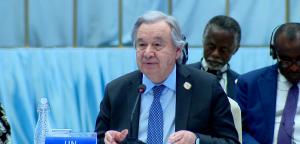
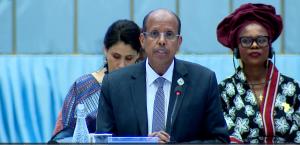
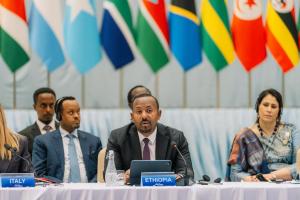
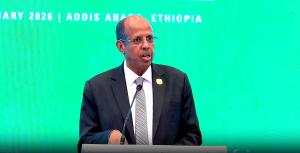
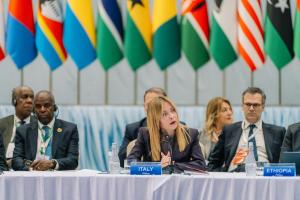






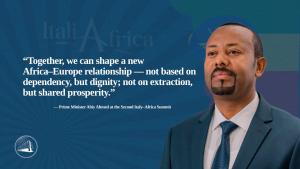

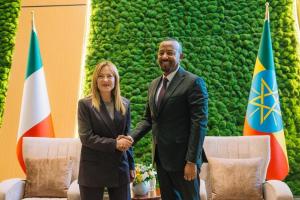
.jpg)

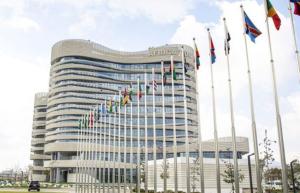
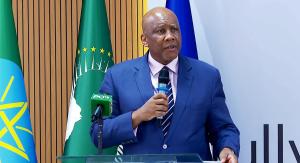
.jpg)
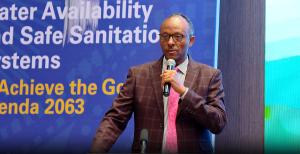
.jpg)
.jpg)
.jpg)

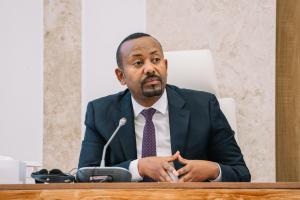
.jpg)
.jpg)
.jpg)


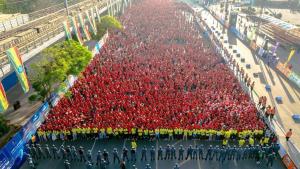

.jpg)
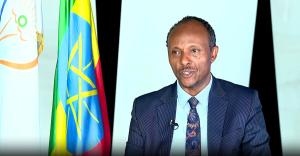
.jpg)
.jpg)

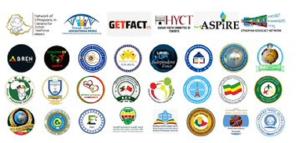

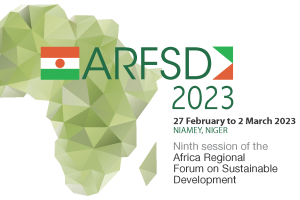
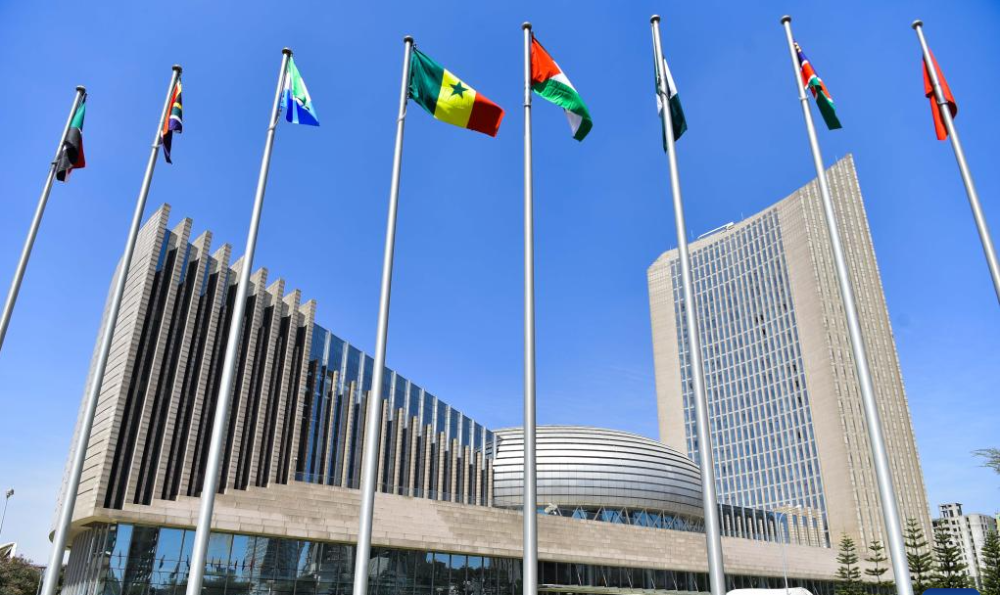
.jpg)